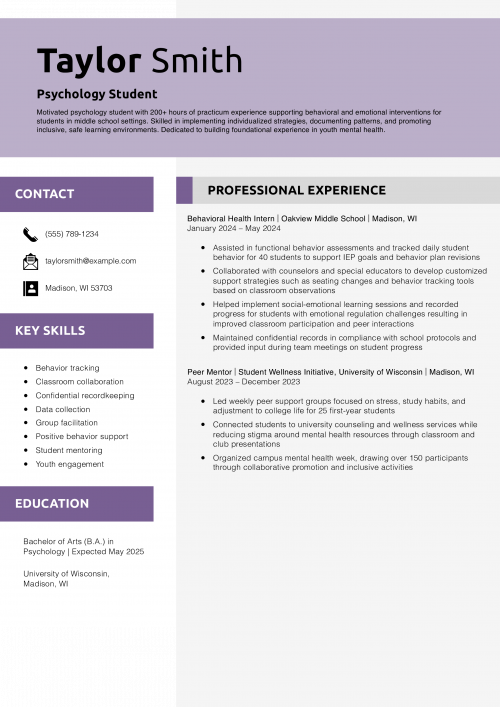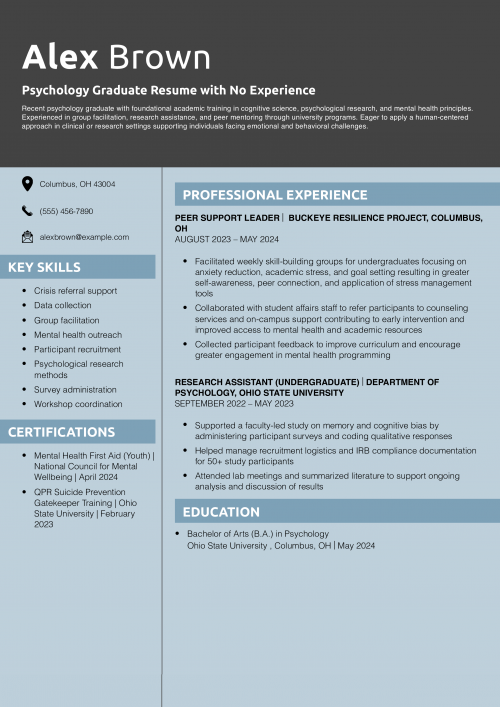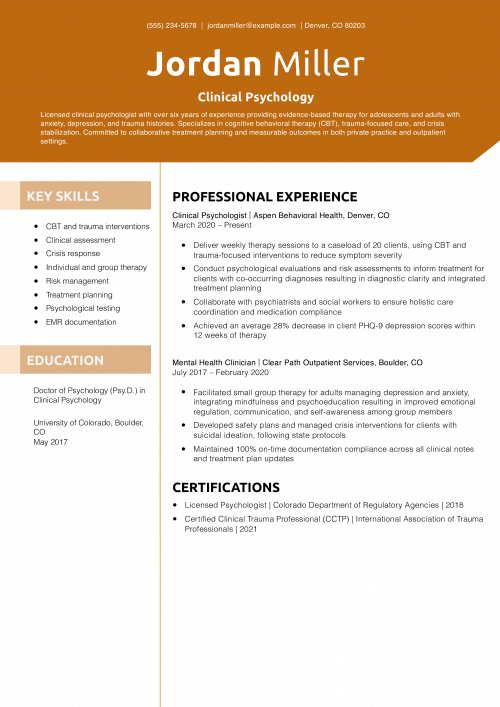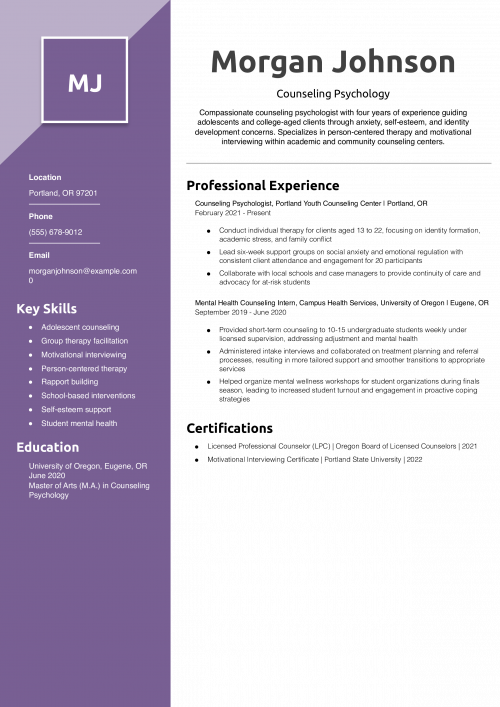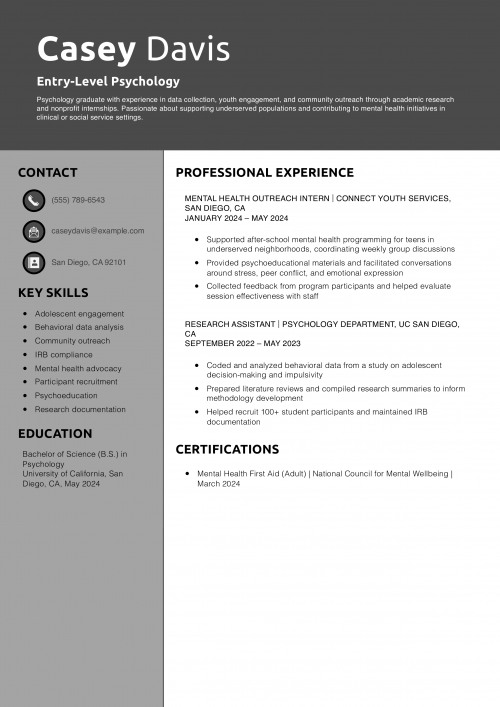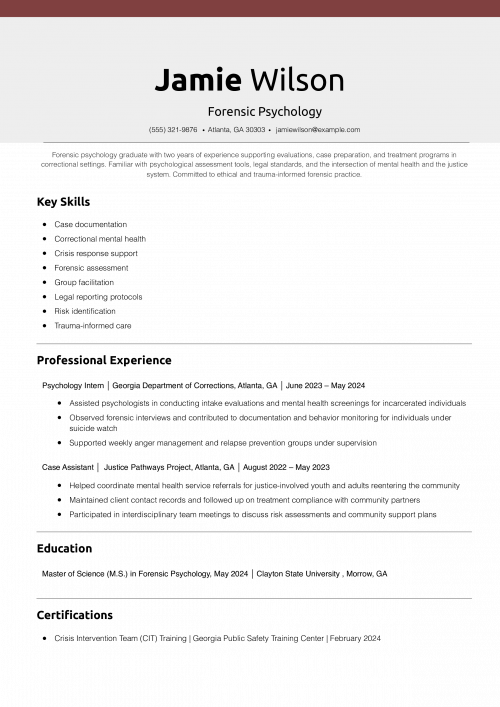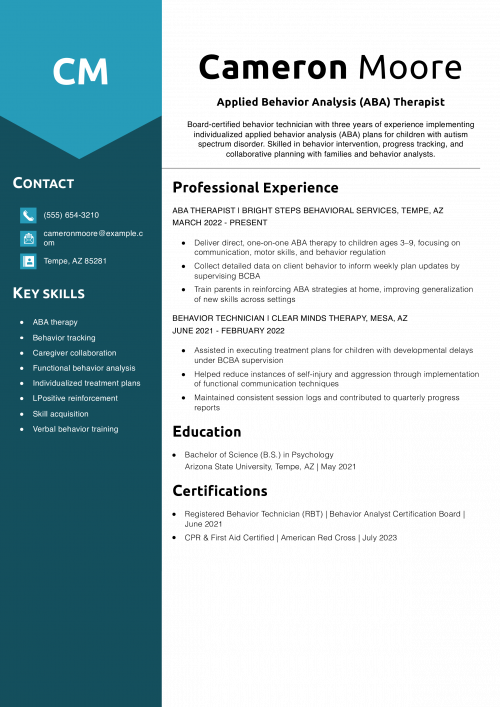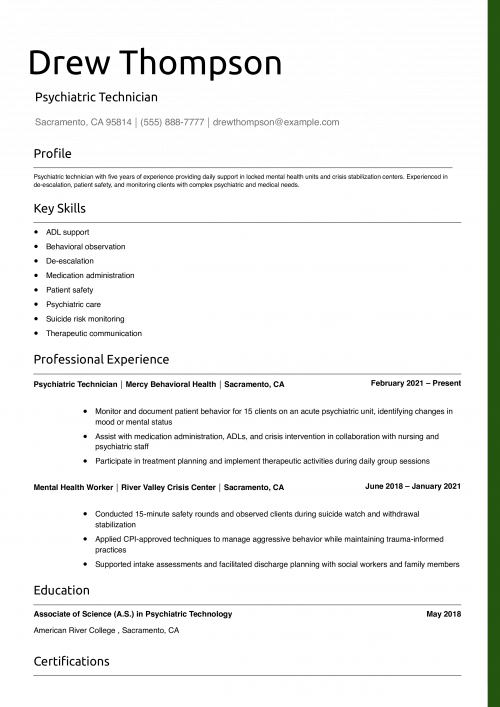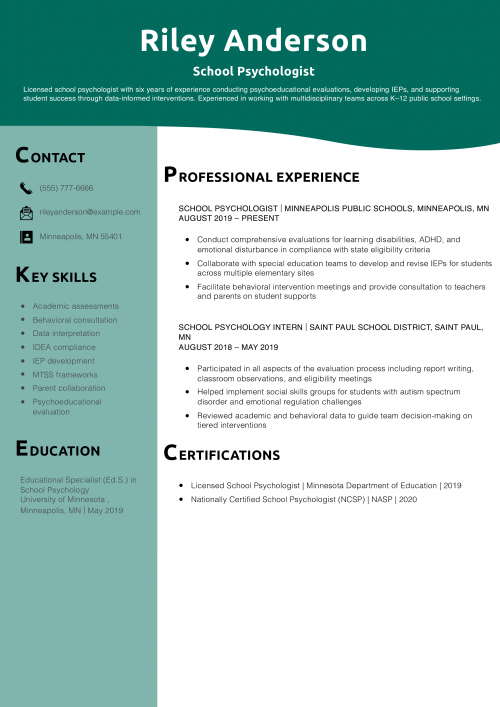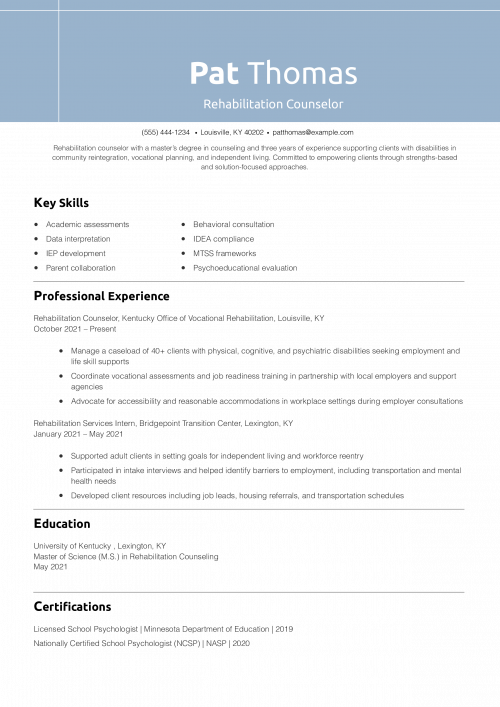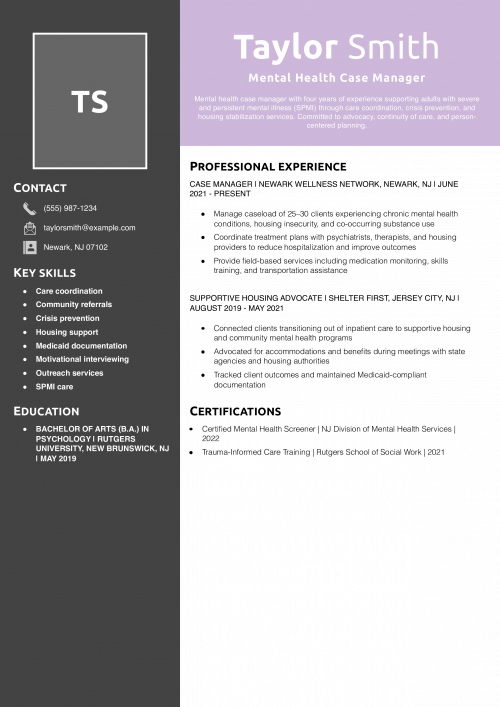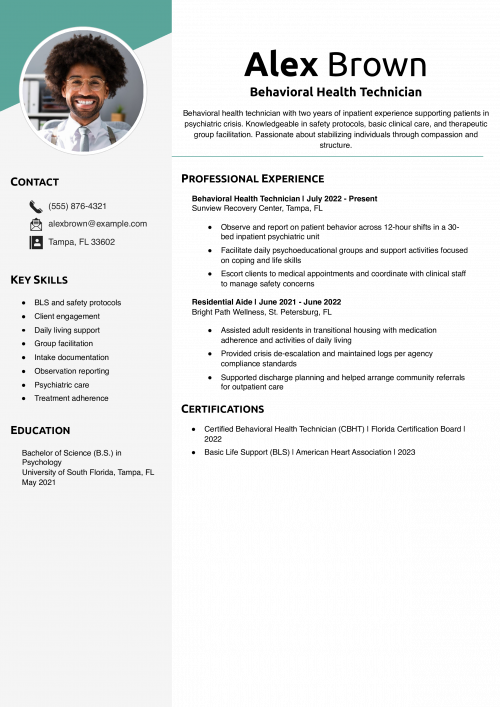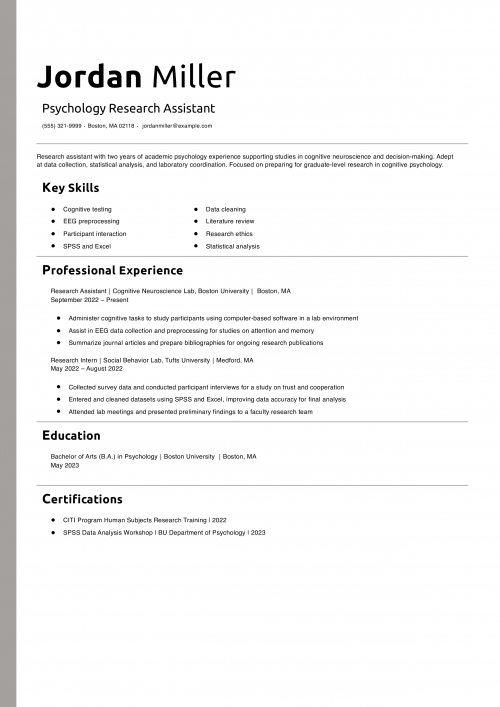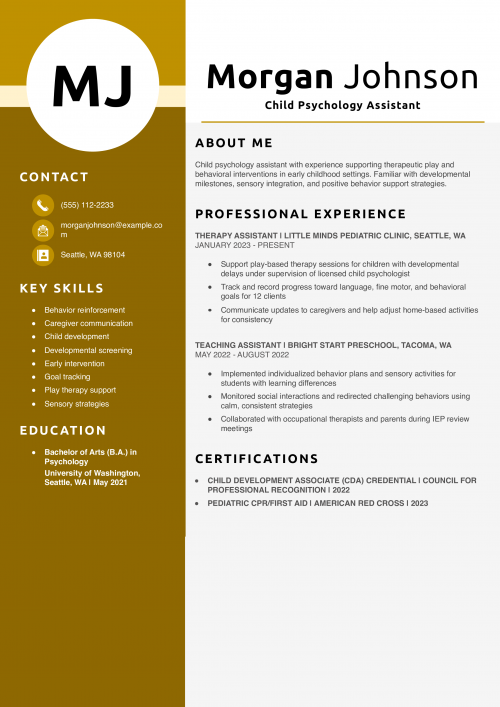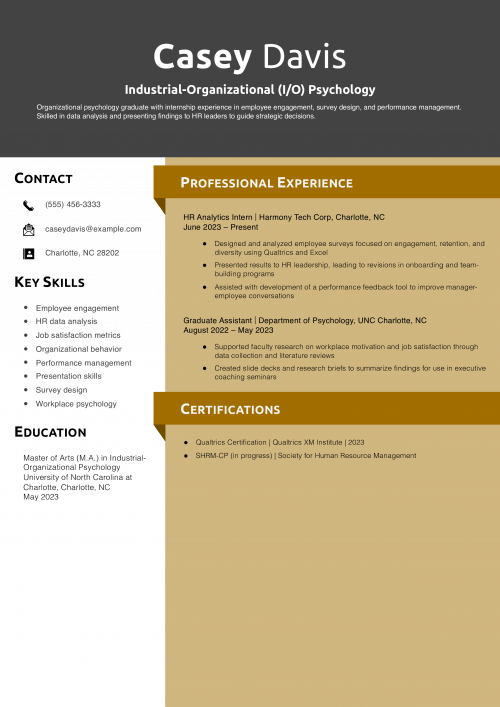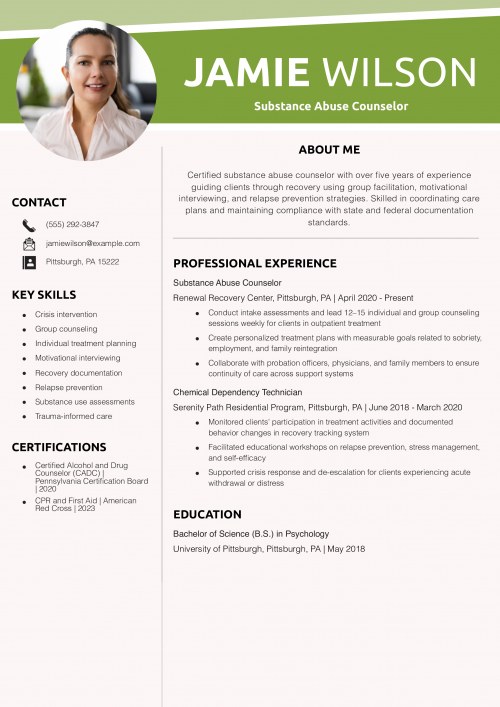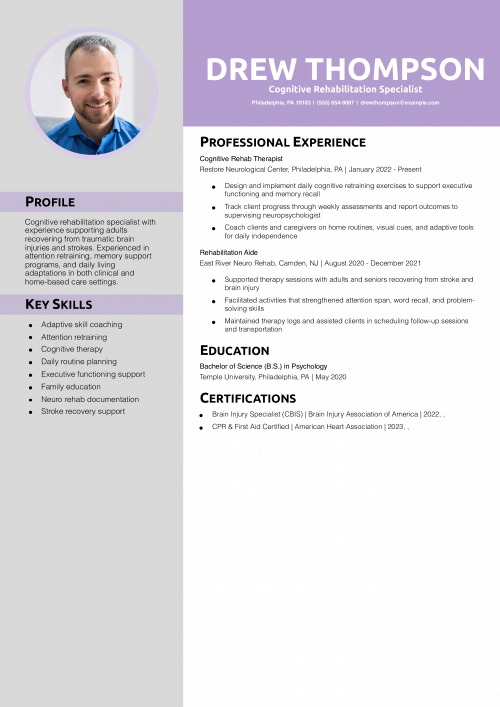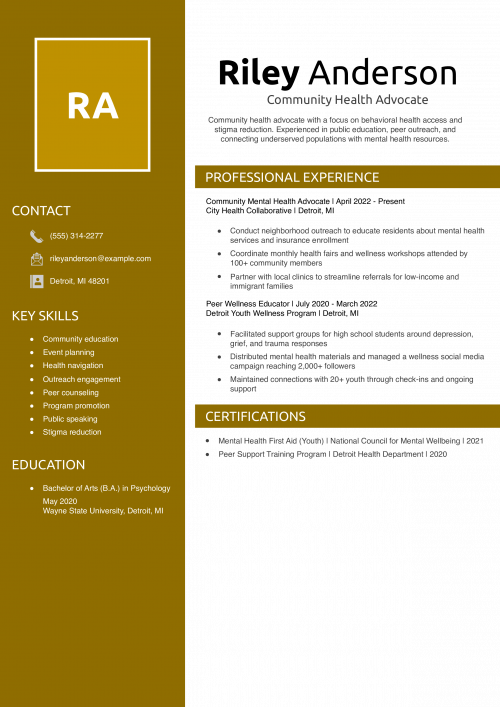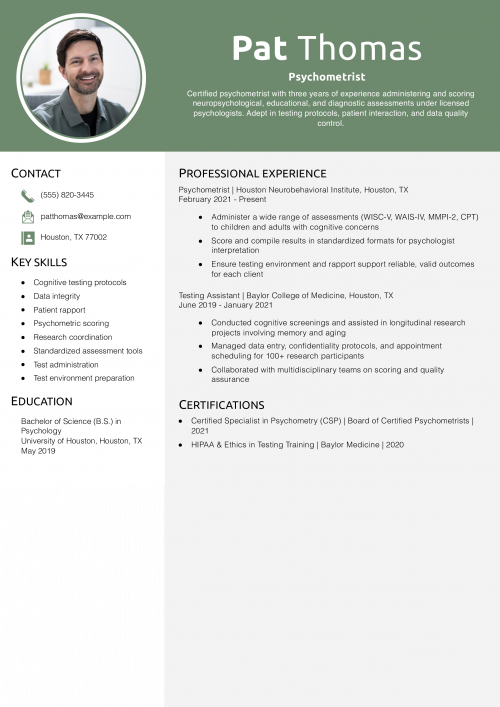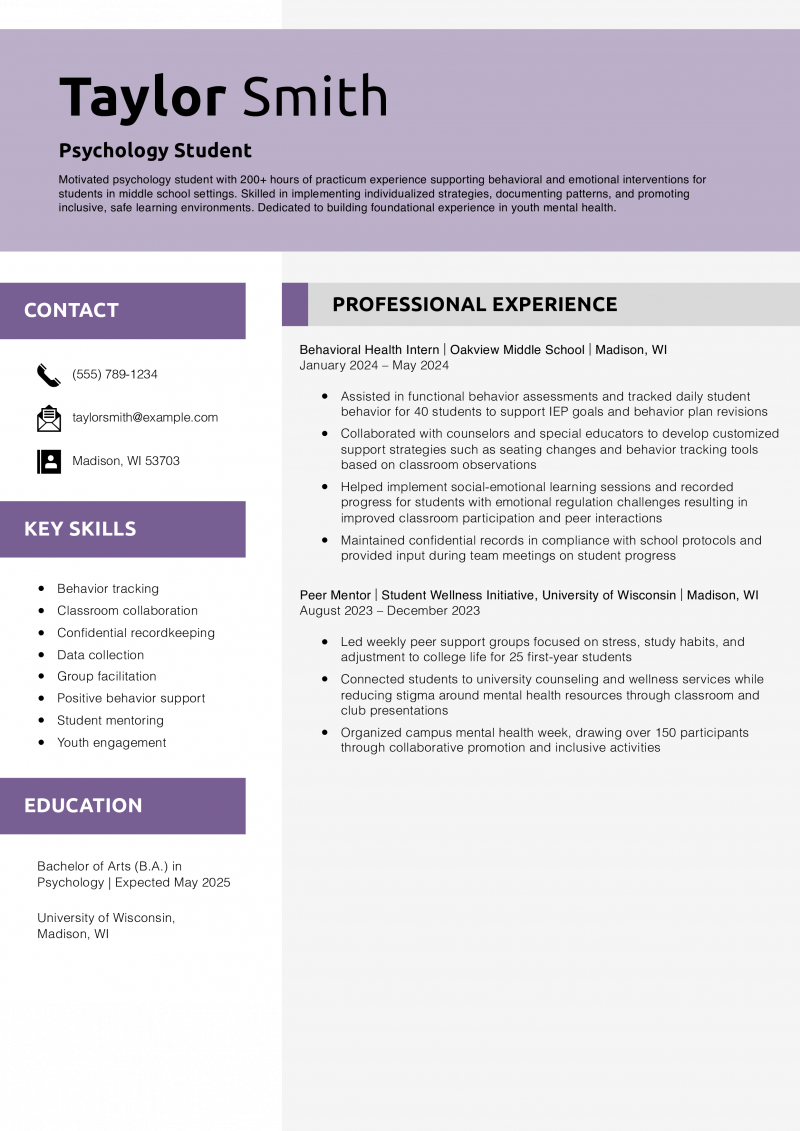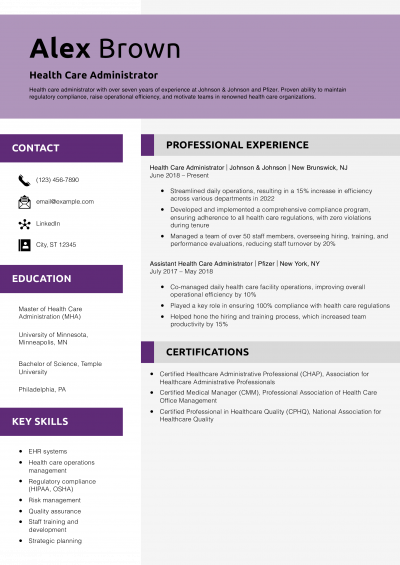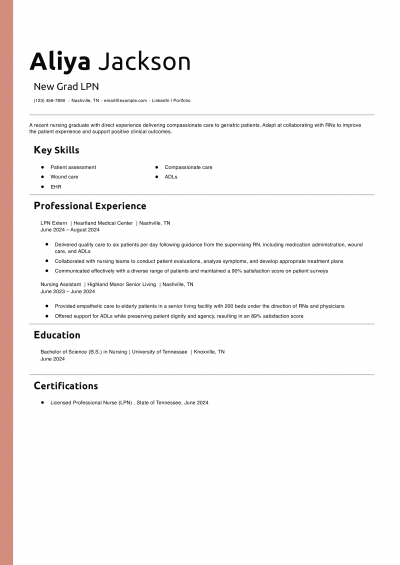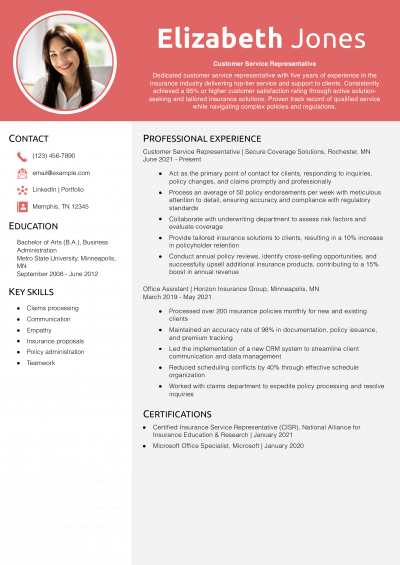As a psychologist, you need a powerful resume that conveys your clinical expertise and ability to deliver exceptional mental health services. A resume isn’t just a broad overview of your credentials; it’s a reflection of the impact you’ve made on clients’ lives. Your content should illustrate your unique approach to mental health care, the populations you’ve served, and the positive outcomes that resulted from your treatment plans. In this guide, we’ll provide expert tips and insights to help you translate your psychology career into an engaging resume.
Key takeaways:
- Emphasize your specializations: Feature your areas of clinical expertise using tangible examples from your career, such as child psychology, neuropsychology, forensic psychology, and counseling psychology.
- Quantify your accomplishments: Incorporate hard numbers and metrics to convey the positive impact you’ve had on patients and the effectiveness of your treatment plans. For example, you might highlight goal attainment rates, clinical outcomes, and reductions in symptom severity.
- Optimize for the ATS: Include skills and terminology from the job description to ensure compliance with applicant tracking systems (ATS), such as cognitive psychology and developmental psychology.
Most Popular Psychology Resumes
Psychology Student Resume Example
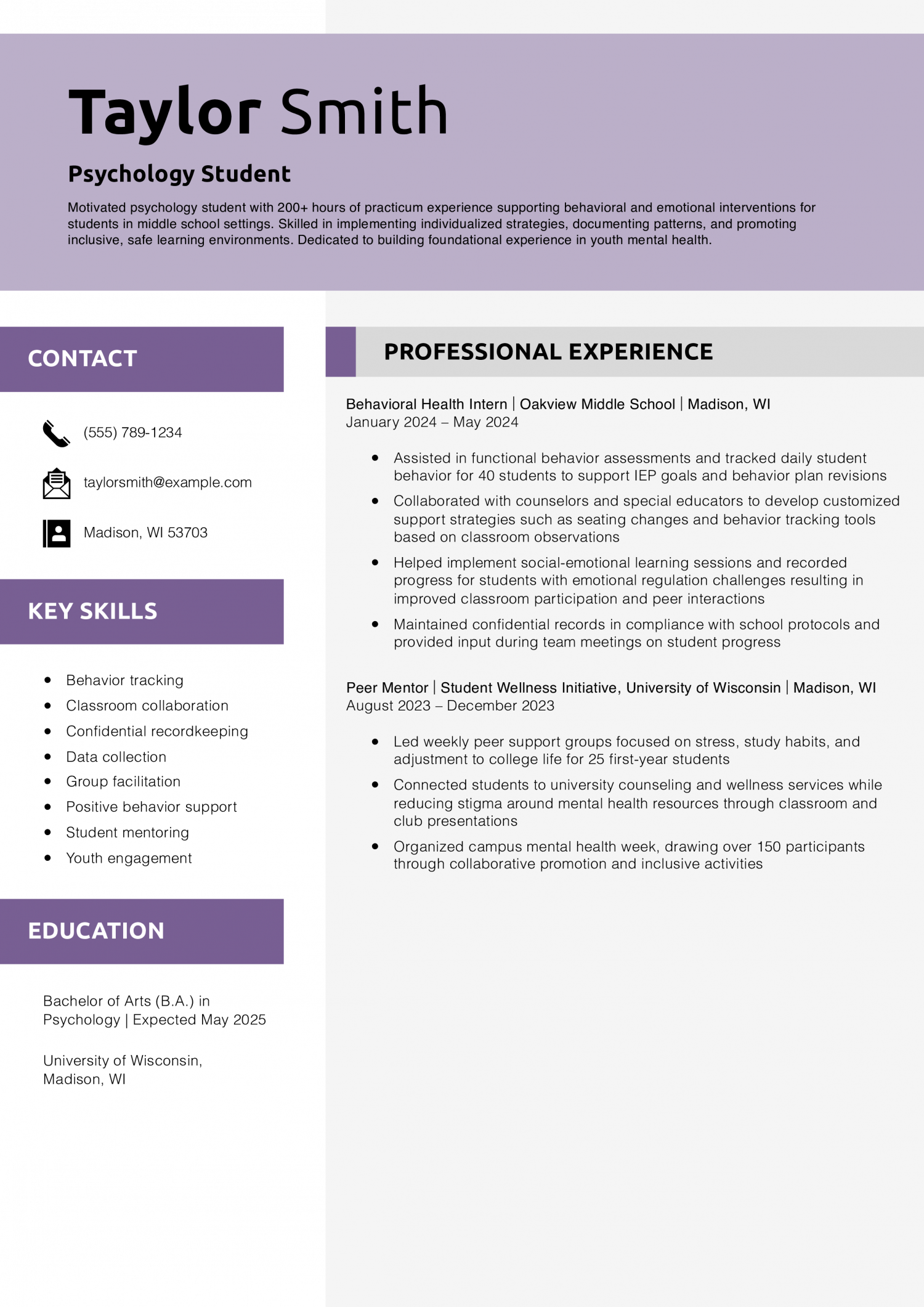
Why This Resume Is a Great Example
Taylor Smith’s resume showcases meaningful experience in school-based mental health settings and a clear passion for student support. The bullet points are expanded to reflect not just duties but outcomes and collaboration. Their role in both peer mentoring and formal interventions positions them as an emerging professional ready for continued development.
For more insights on building your resume, visit our guide.
Psychology Graduate Resume with No Experience
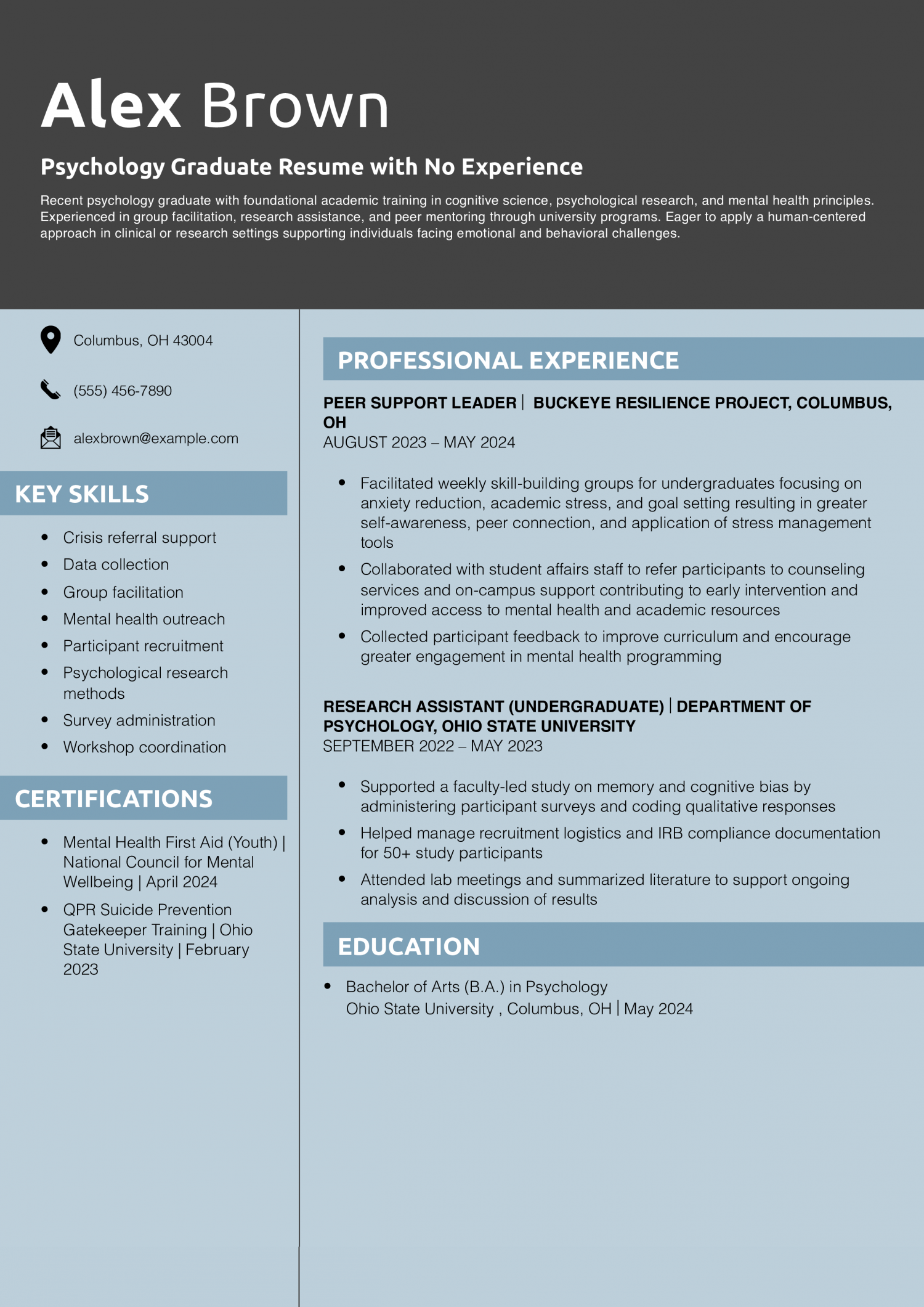
Why This Resume Is a Great Example
Alex Brown’s resume makes the most of academic and campus experience, showing initiative, applied learning, and strong interest in mental health. Though they lack formal job history, the bullet points highlight collaborative contributions and real-world exposure to peer support and research. For more insights on building your resume, visit our guide.
Clinical Psychology Resume Example
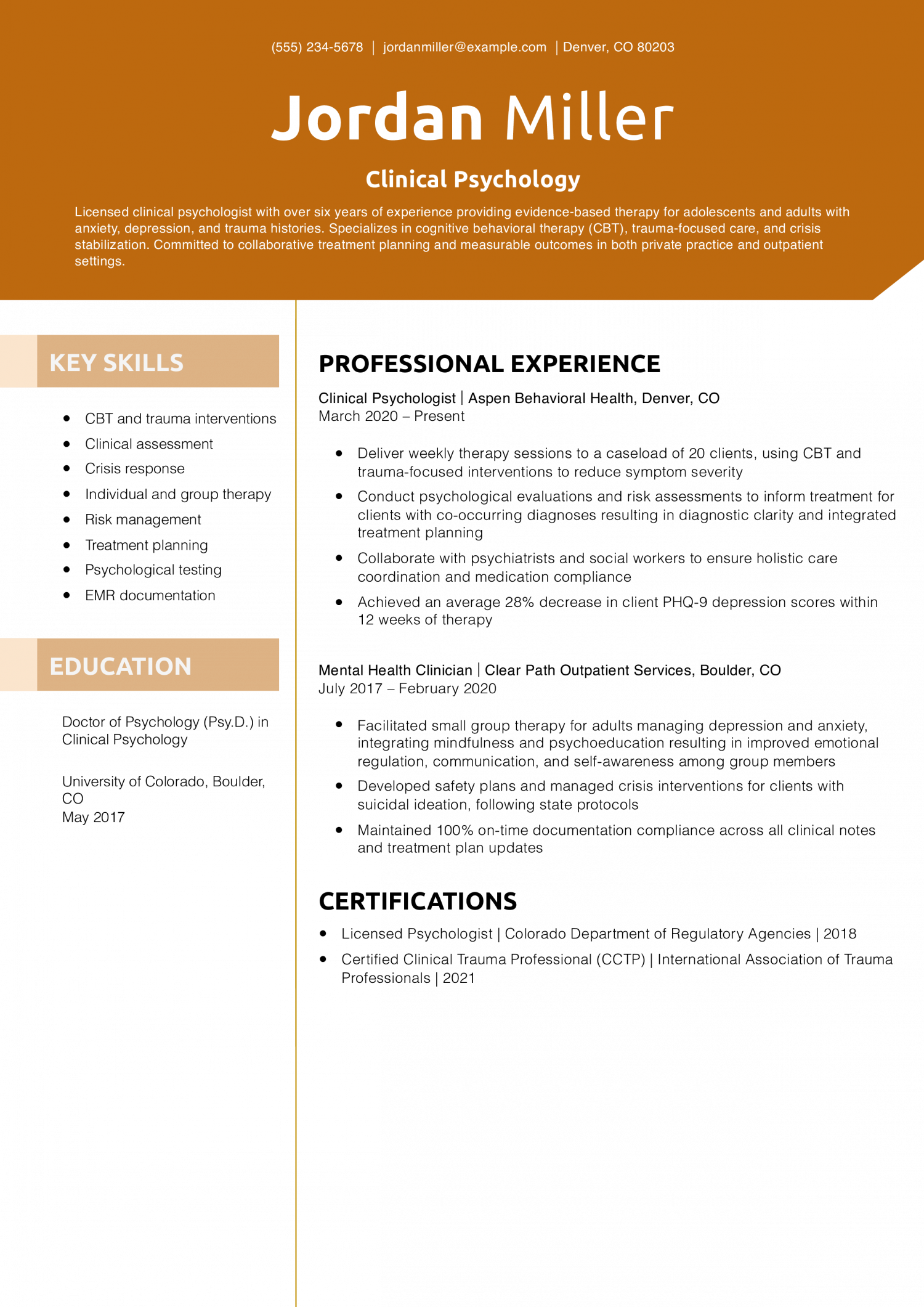
Why This Resume Is a Great Example
Jordan Miller’s resume showcases clinical depth with quantifiable impact, like reductions in PHQ-9 scores. It reflects collaborative, ethical practice with measurable outcomes. Their dual experience in individual and group settings helps them stand out.
Counseling Psychology Resume Example
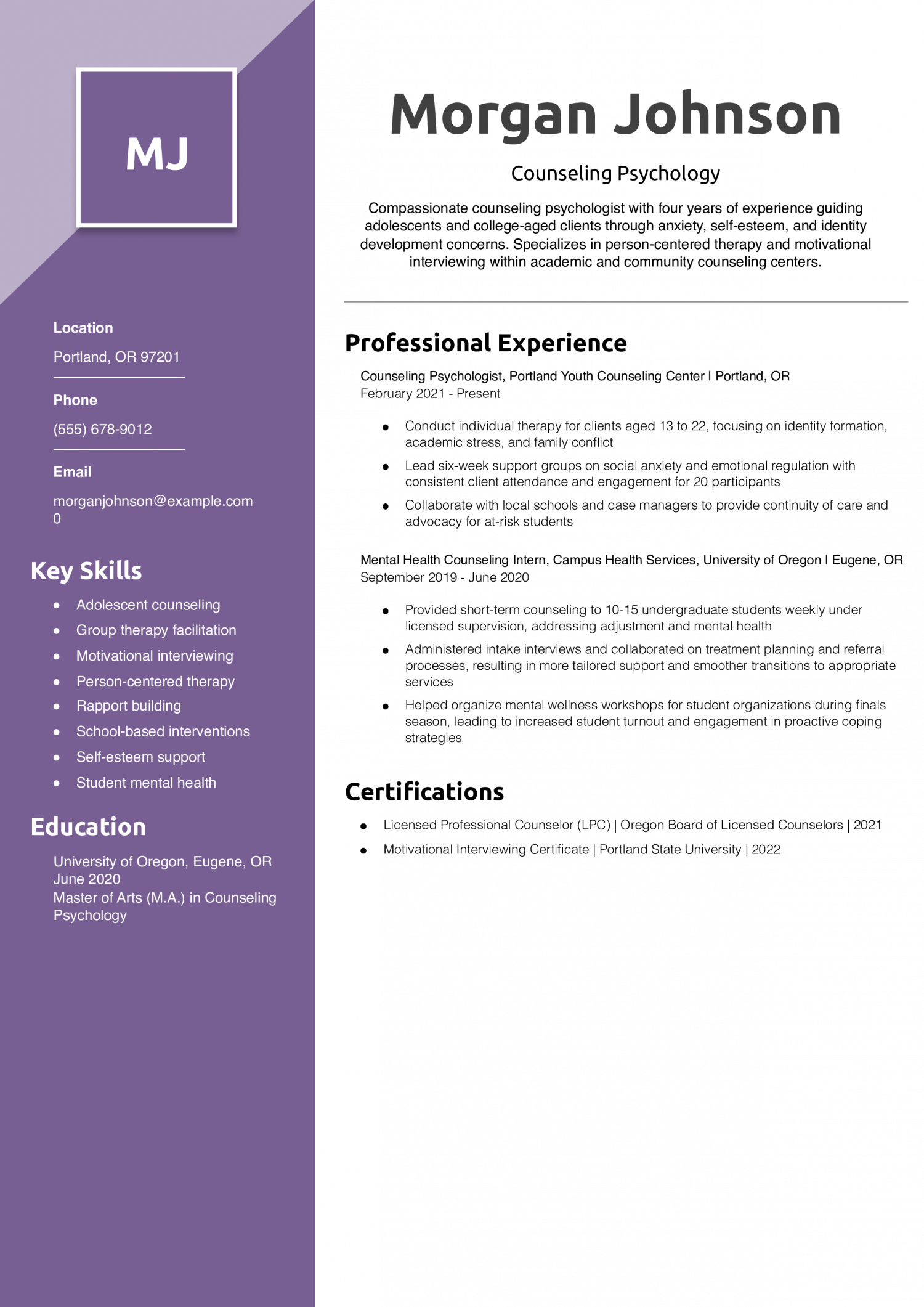
Why This Resume Is a Great Example
Morgan Johnson’s resume speaks directly to the needs of youth mental health settings. Each experience focuses on therapy methods, client outcomes, and collaboration, with skill sets that are highly transferable. For more insights on building your resume, visit our guide.
Entry-Level Psychology Resume Example
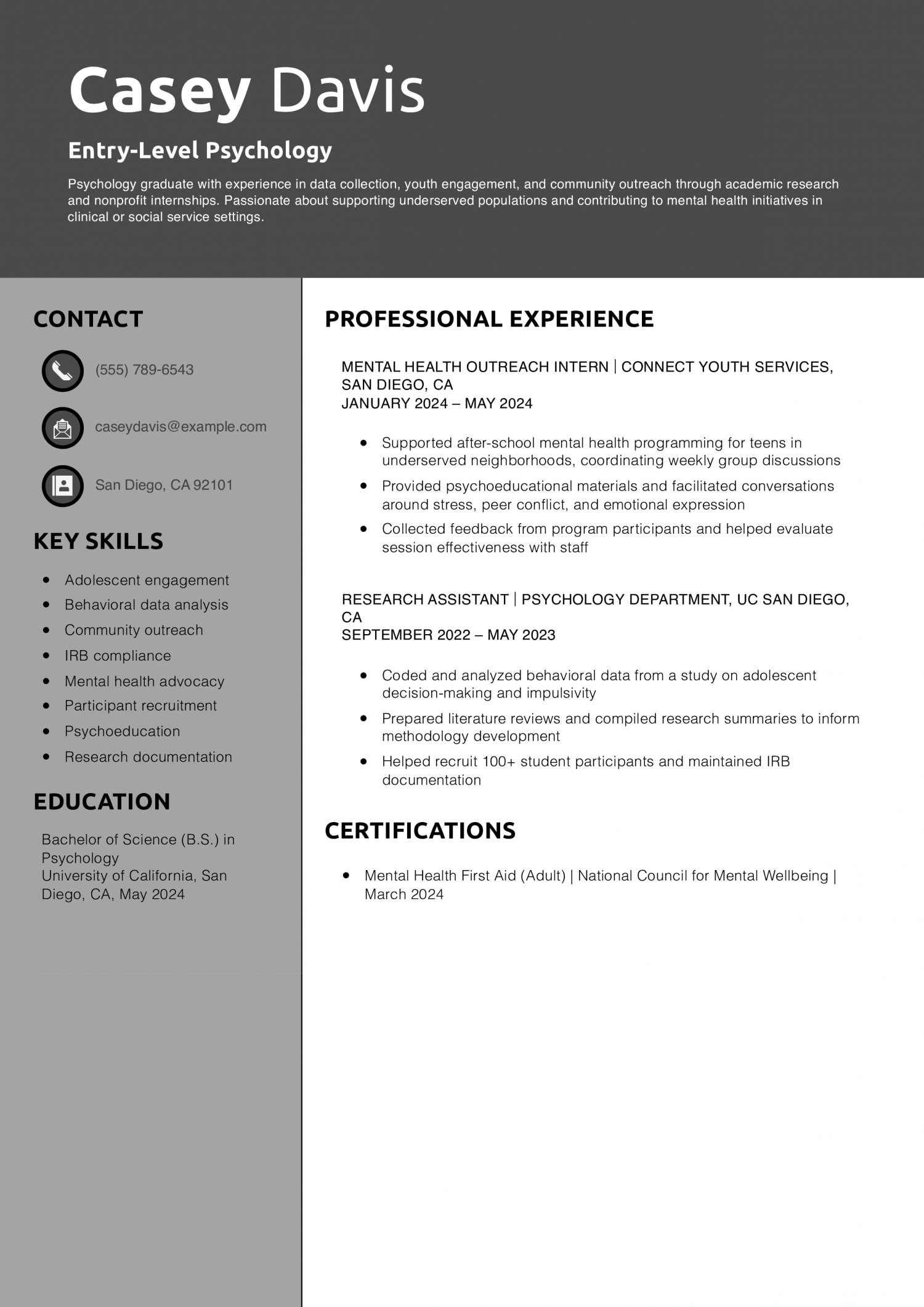
Why This Resume Is a Great Example
Casey Davis’s resume effectively bridges academic and real-world experiences. Their community involvement and applied research show they’re ready for an entry-level mental health role. The resume’s clarity and purpose-driven content help it stand out. For more insights on building your resume, visit our guide.
Forensic Psychology Resume Example
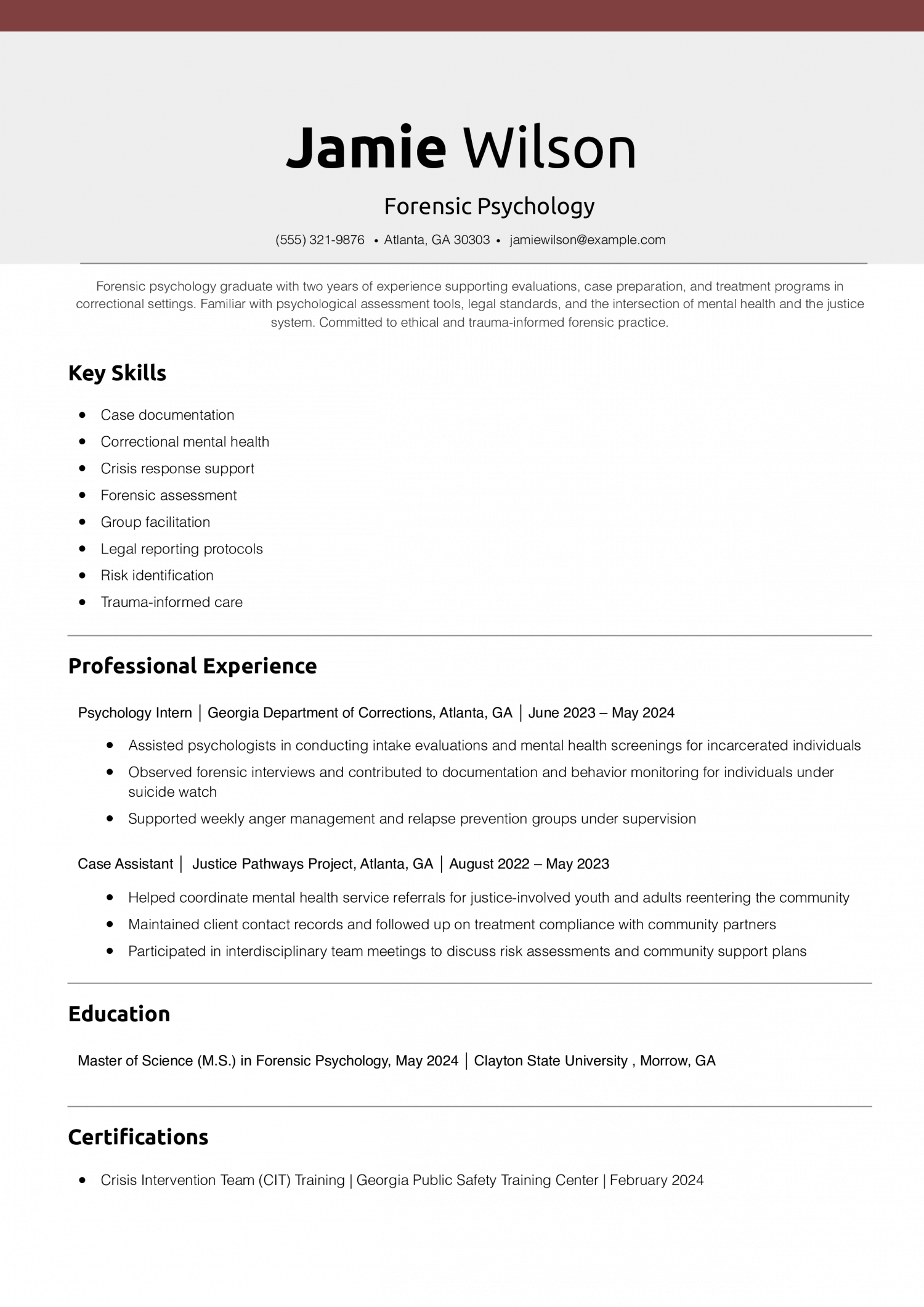
Why This Resume Is a Great Example
Jamie Wilson’s resume is tightly aligned with the forensic psychology field. From correctional care to legal coordination, the experience is grounded in both psychological insight and justice system awareness. For more insights on building your resume, visit our guide.
Applied Behavior Analysis (ABA) Therapist Resume Example
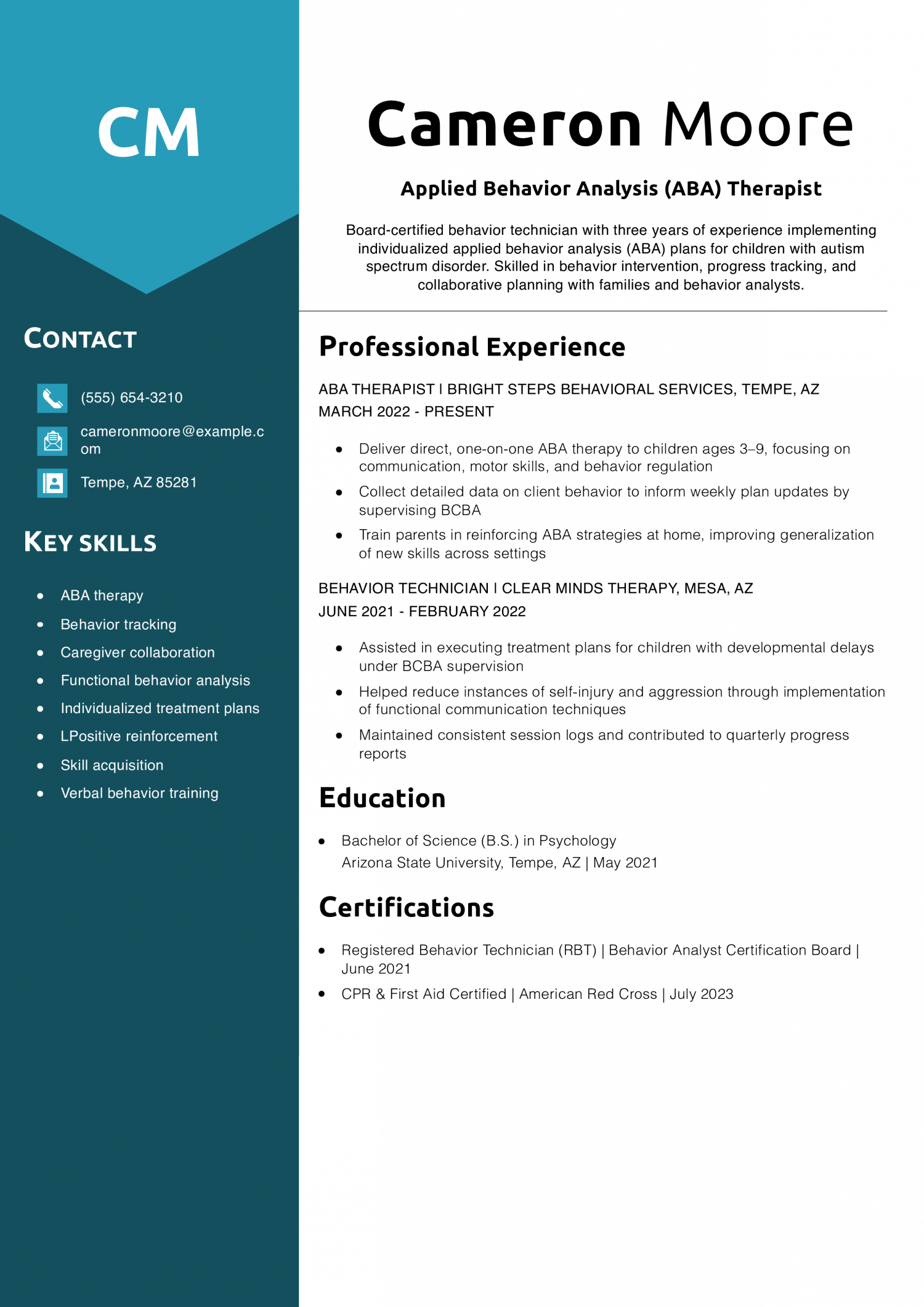
Why This Resume Is a Great Example
Cameron Moore’s resume highlights measurable work with ABA clients, with a focus on collaboration and consistency. Their RBT certification and relevant experience help demonstrate readiness for both clinic and in-home roles. For more insights on building your resume, visit our guide.
Psychiatric Technician Resume Example
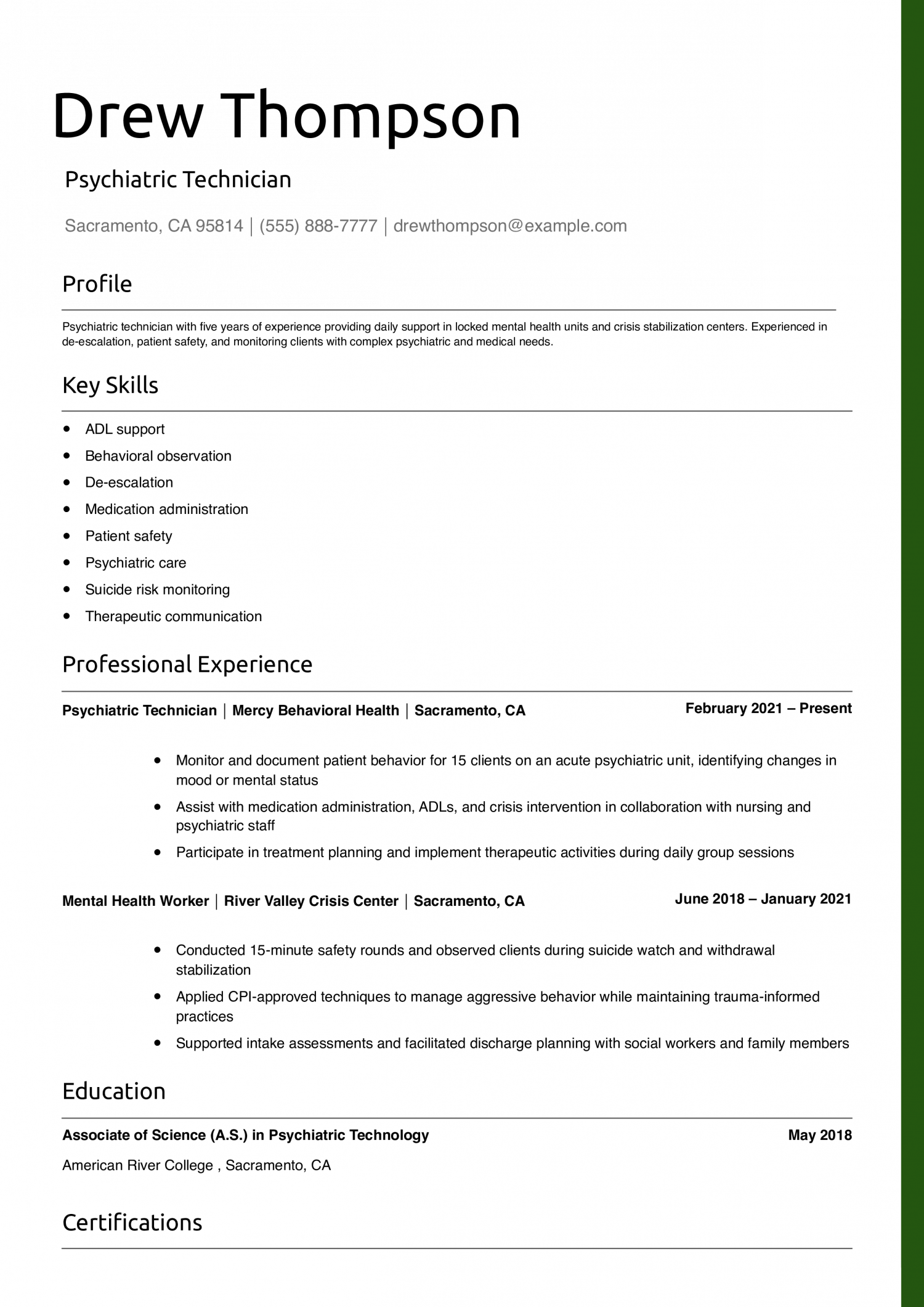
Why This Resume Is a Great Example
Drew Thompson’s resume emphasizes direct care for psychiatric populations and includes licensure and CPI certification. Each bullet demonstrates responsibility in high-pressure environments. For more insights on building your resume, visit our guide.
School Psychologist Resume Example
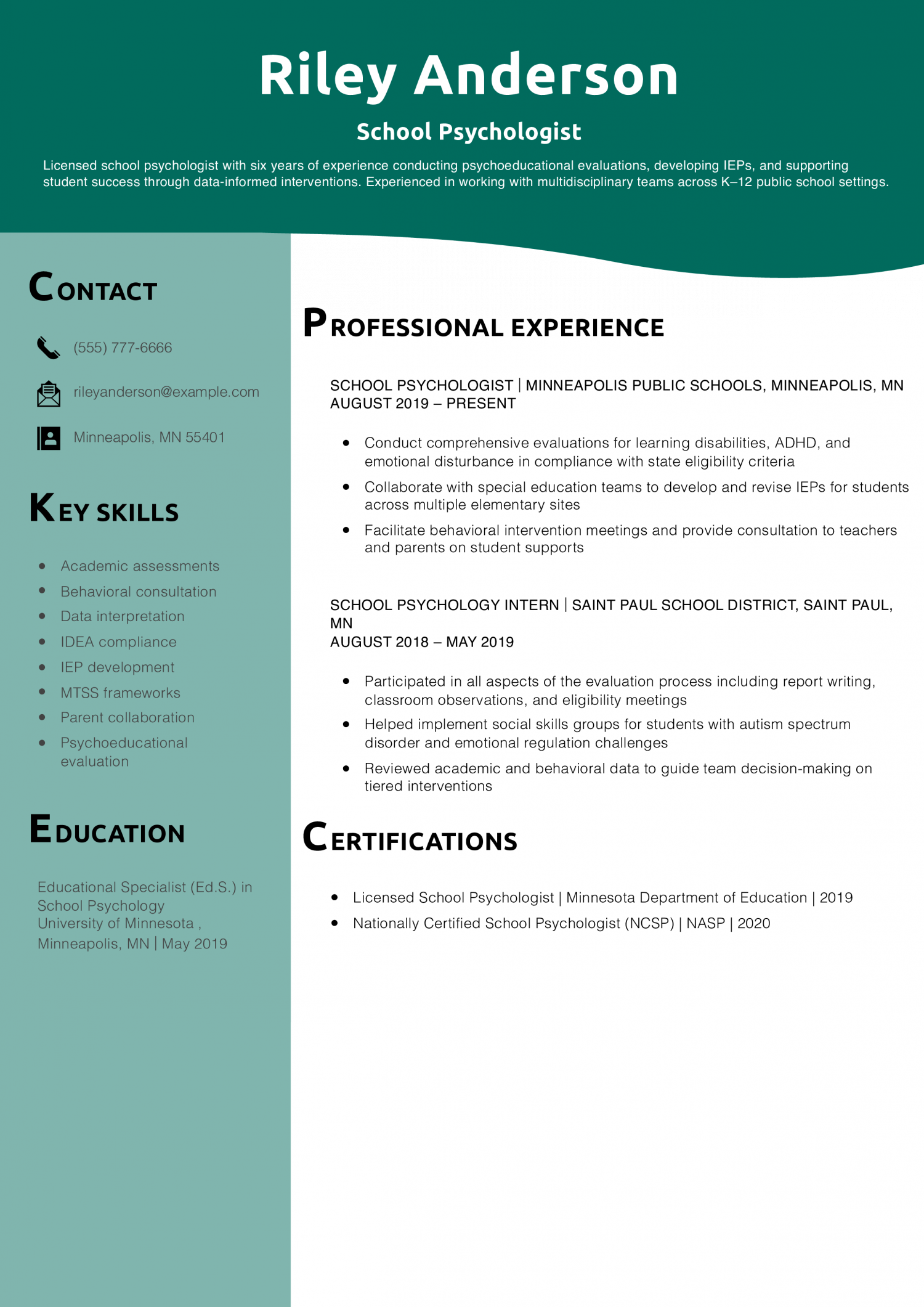
Why This Resume Is a Great Example
Riley Anderson’s resume showcases deep knowledge of school-based psychological services, with concrete examples of collaboration and impact. The Ed.S. degree and national certification solidify their qualifications. For more insights on building your resume, visit our guide.
Rehabilitation Counselor Resume Example
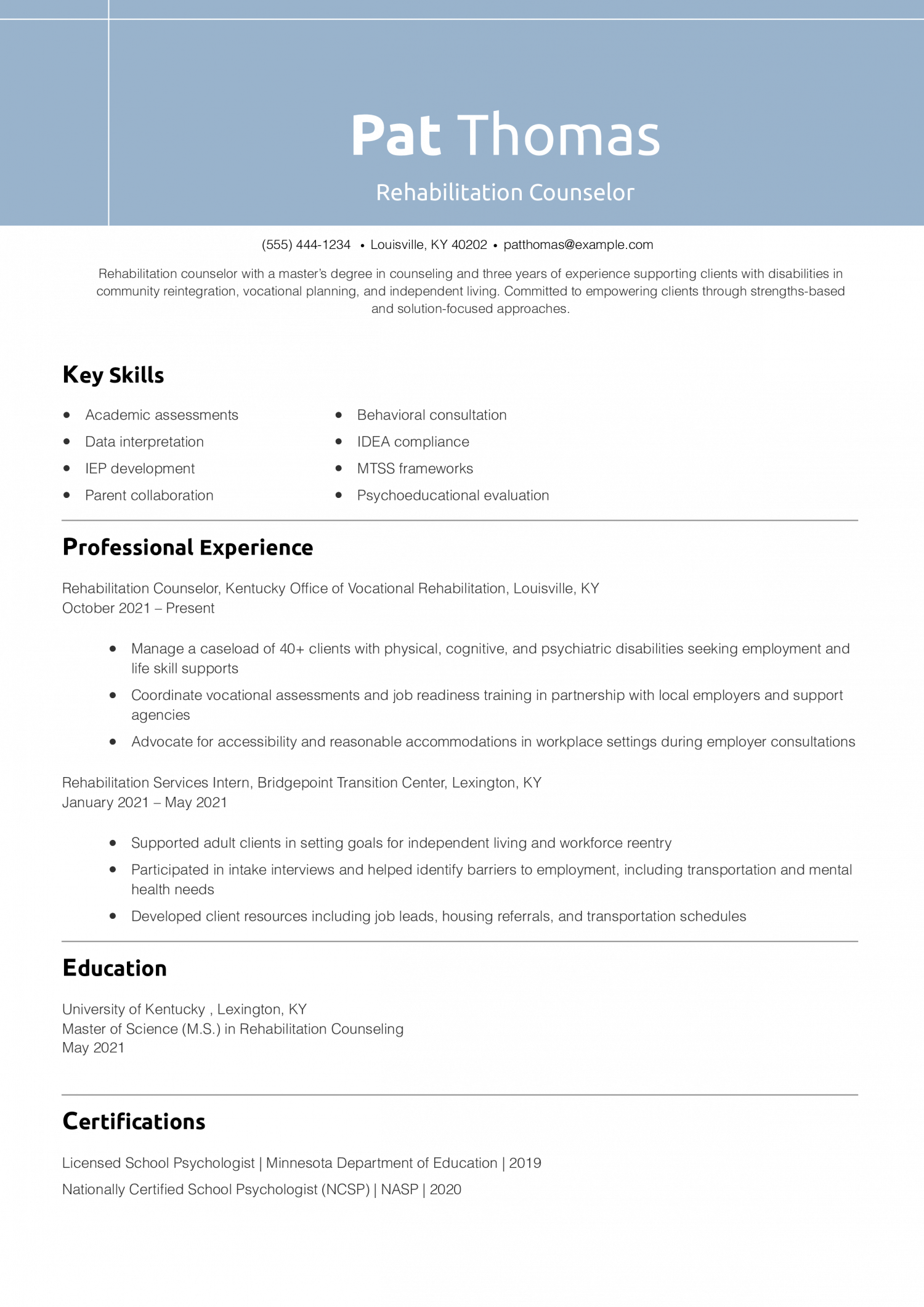
Why This Resume Is a Great Example
Pat Thomas’s resume reflects a strong foundation in both one-on-one client work and systems-level advocacy. Their certifications and real-world examples of employment support make this resume especially relevant for public or nonprofit settings. For more insights on building your resume, visit our guide.
Mental Health Case Manager Resume Example
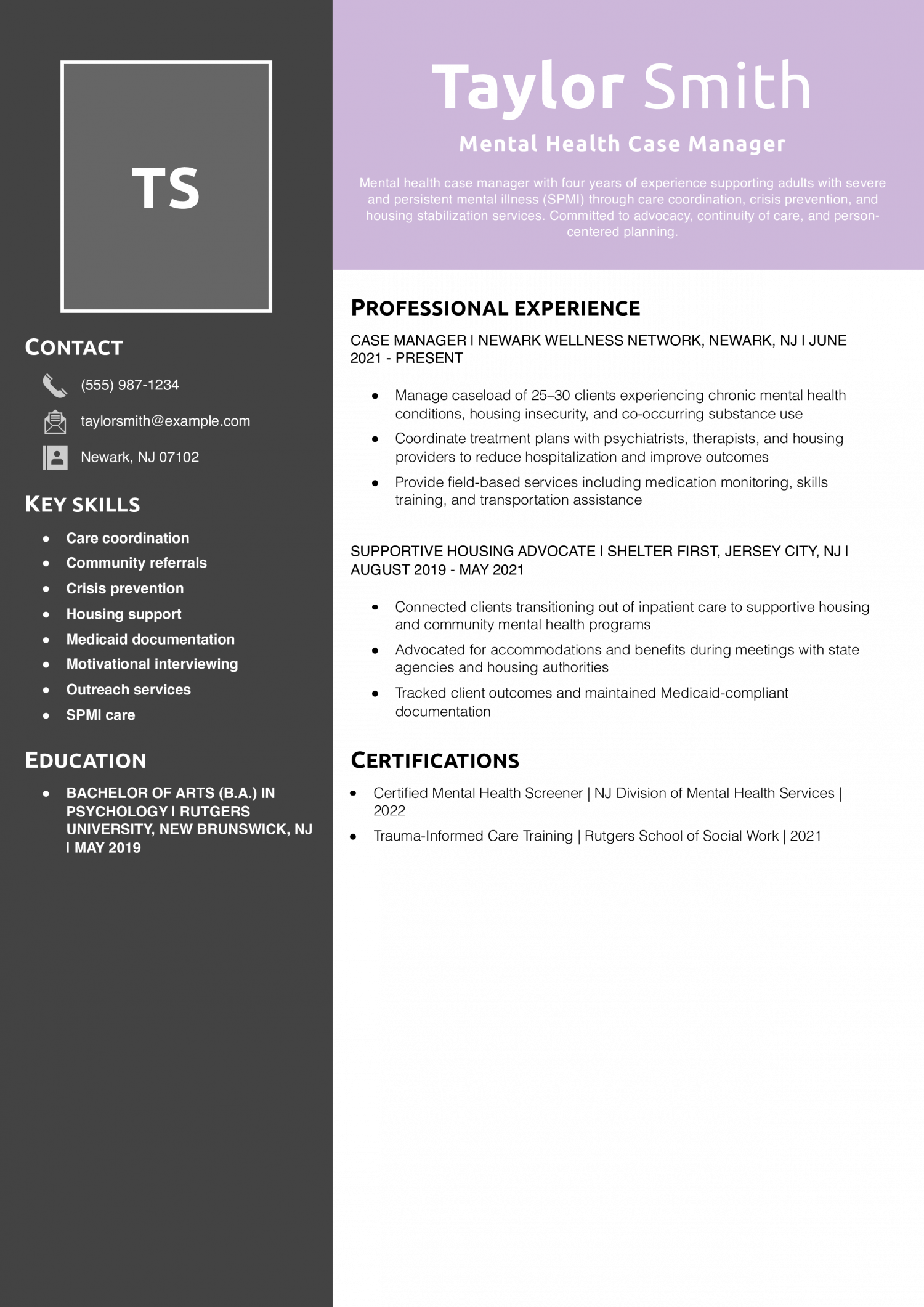
Why This Resume Is a Great Example
Taylor Smith’s resume highlights their case management depth, advocacy experience, and consistent work in high-need populations. The certifications and skillset demonstrate readiness for integrated behavioral health roles. For more insights on building your resume, visit our guide.
Behavioral Health Technician Resume Example
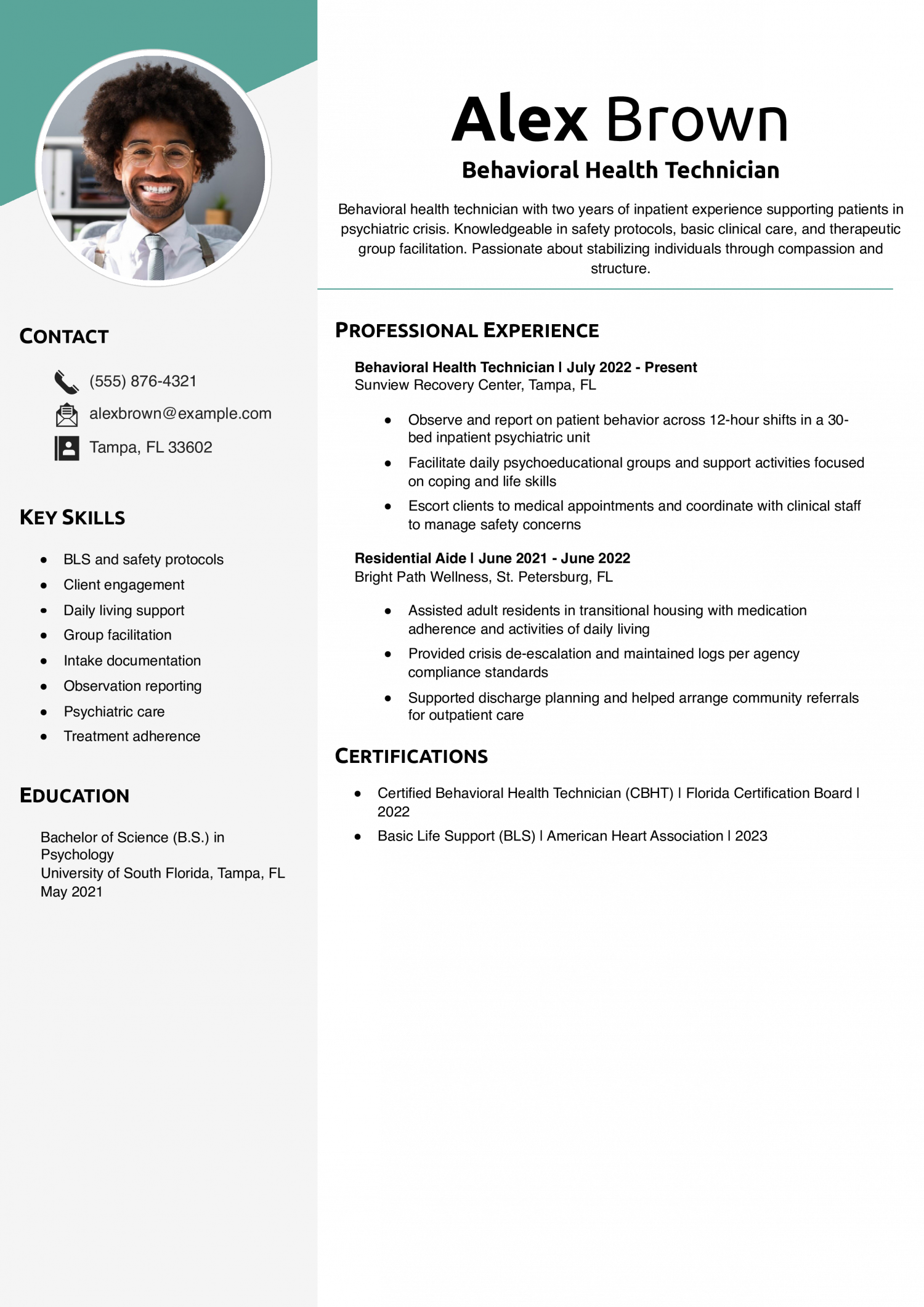
Why This Resume Is a Great Example
Alex Brown’s resume focuses on practical skills and safety-sensitive duties in residential and inpatient care. With strong certifications and consistent experience, this candidate is ideal for behavioral tech or crisis stabilization settings. For more insights on building your resume, visit our guide.
Psychology Research Assistant Resume Example
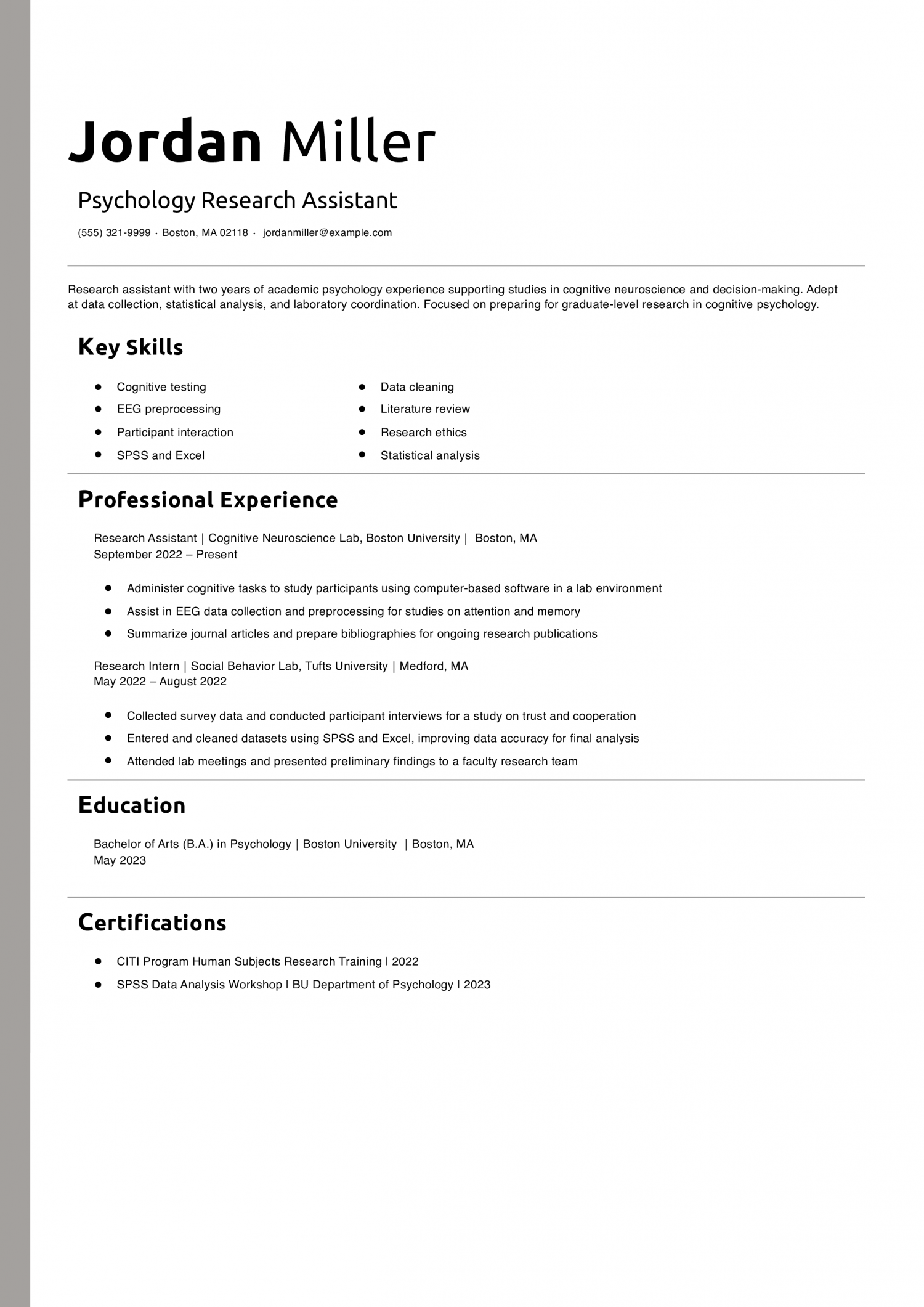
Why This Resume Is a Great Example
Jordan Miller’s resume showcases specialized academic research skills in both cognitive and social domains. Clear lab-based responsibilities and technical training make this ideal for graduate school or research coordinator roles. For more insights on building your resume, visit our guide.
Child Psychology Assistant Resume Example
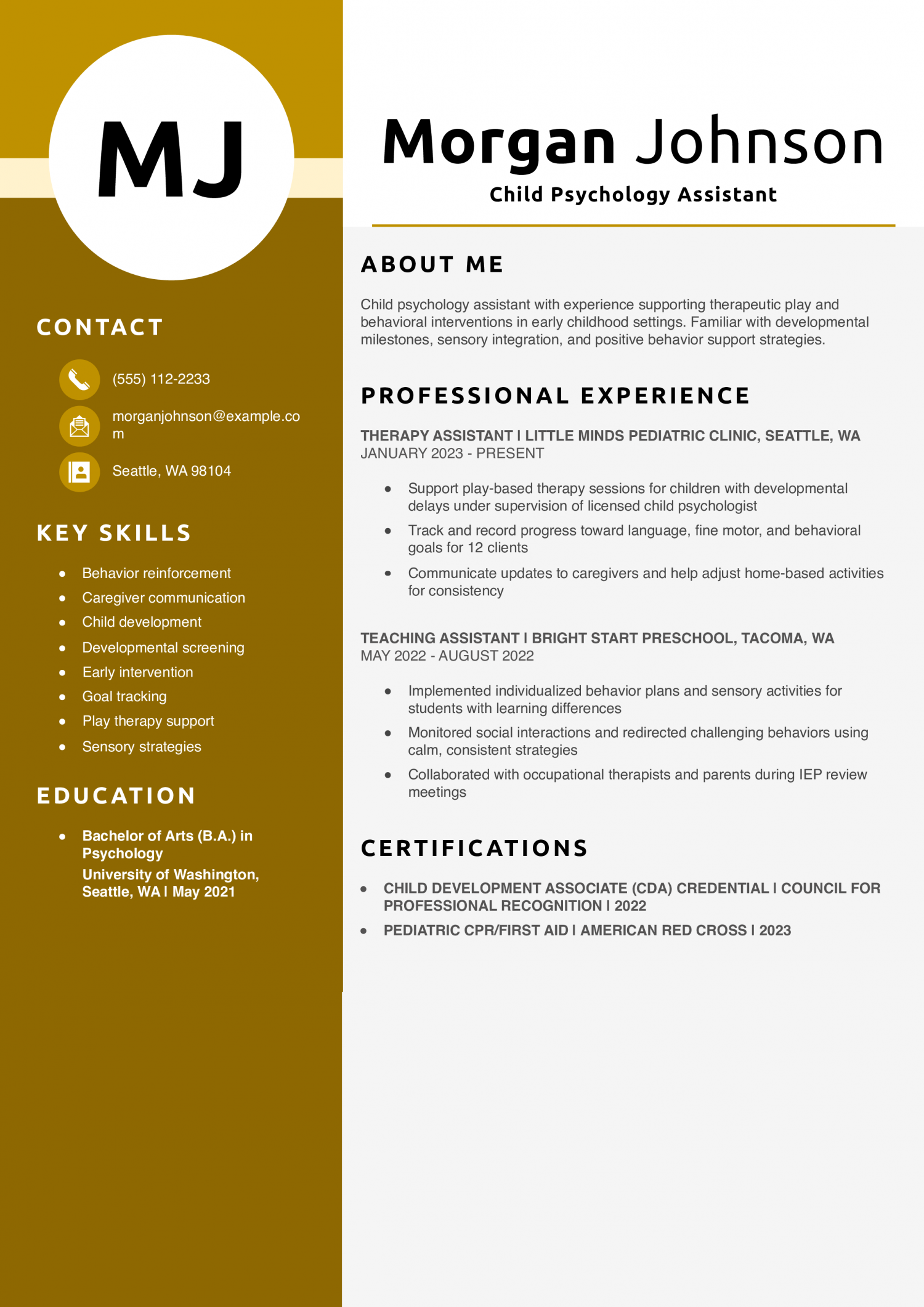
Why This Resume Is a Great Example
Morgan Johnson’s resume reflects strong alignment with early childhood mental health roles. Each bullet shows engagement in behavioral planning and developmental support, which is critical in child psychology settings. For more insights on building your resume, visit our guide.
Industrial-Organizational (I/O) Psychology Resume Example
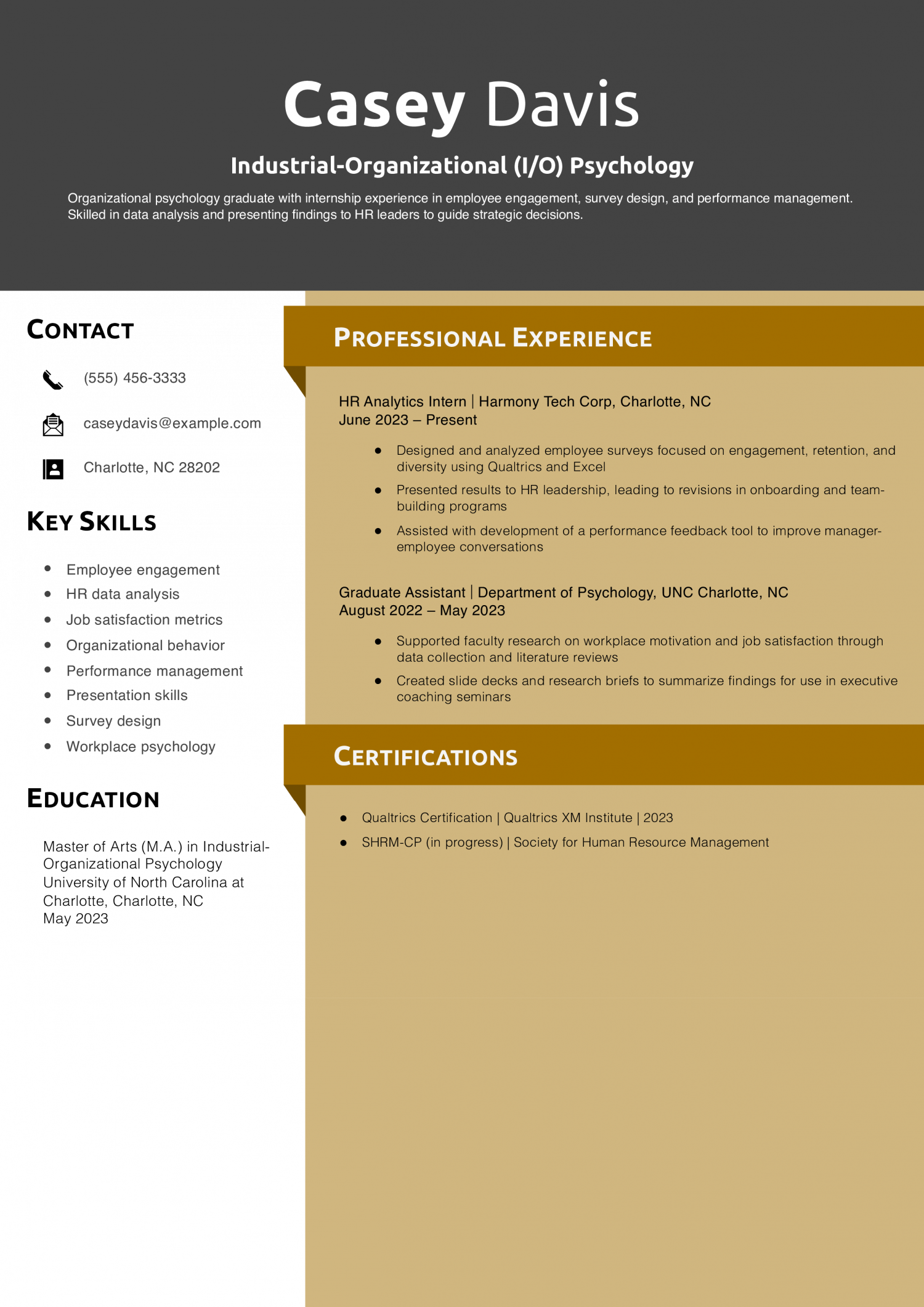
Why This Resume Is a Great Example
Casey Davis’s resume shows how I/O psychology can shape HR practices. With practical skills in survey analytics and clear contributions to business outcomes, this is an excellent example of early-career alignment. For more insights on building your resume, visit our guide.
Substance Abuse Counselor Resume Example
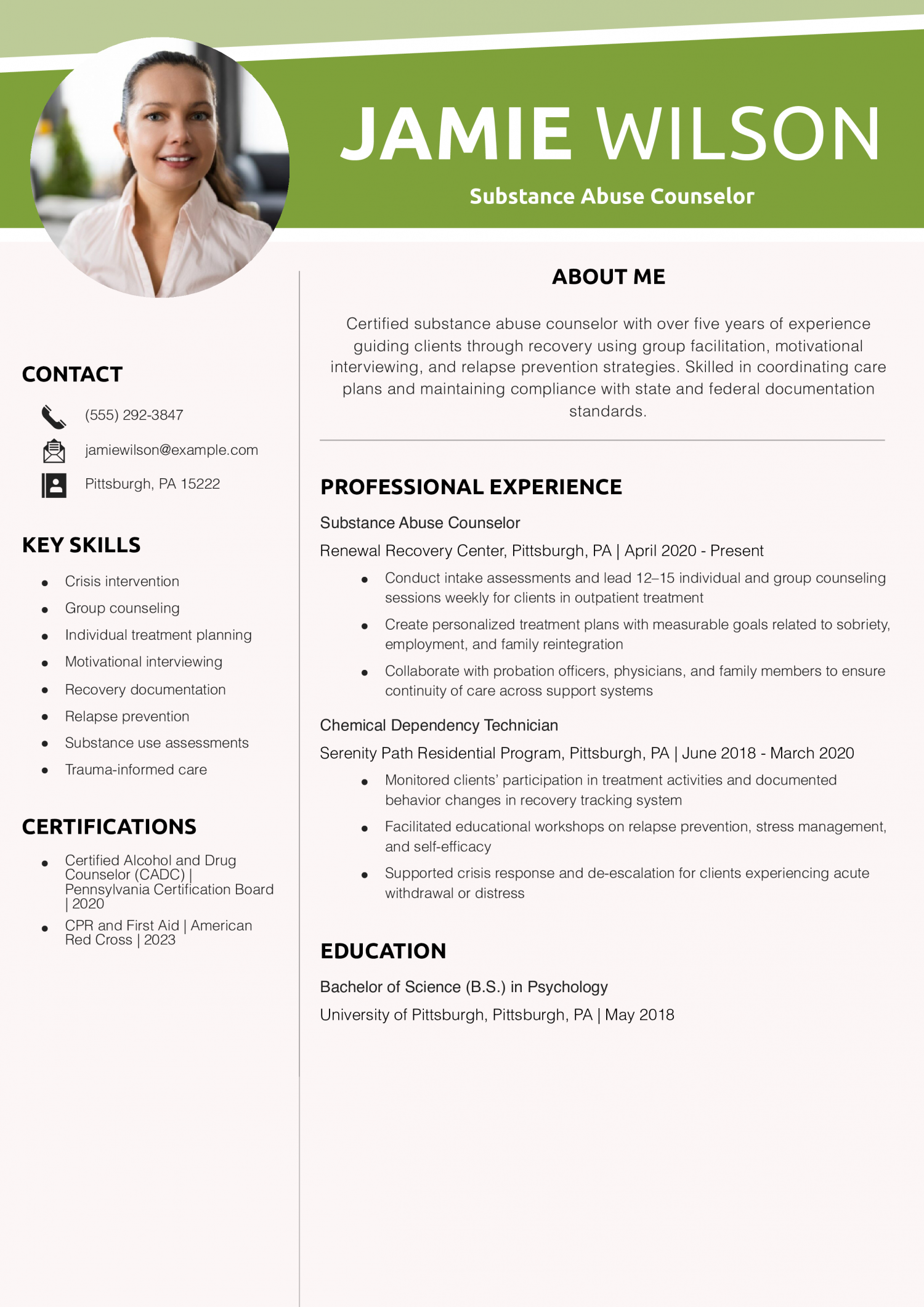
Why This Resume Is a Great Example
Jamie Wilson’s resume highlights measurable experience in substance use treatment and a consistent track record in both residential and outpatient programs. Each section demonstrates compassion, structure, and strategy. For more insights on building your resume, visit our guide.
Crisis Intervention Specialist Resume Example

Why This Resume Is a Great Example
Cameron Moore’s resume communicates calm expertise in high-stakes environments. Each bullet showcases practical, lifesaving skills that require judgment and composure. For more insights on building your resume, visit our guide.
Cognitive Rehabilitation Specialist Resume Example
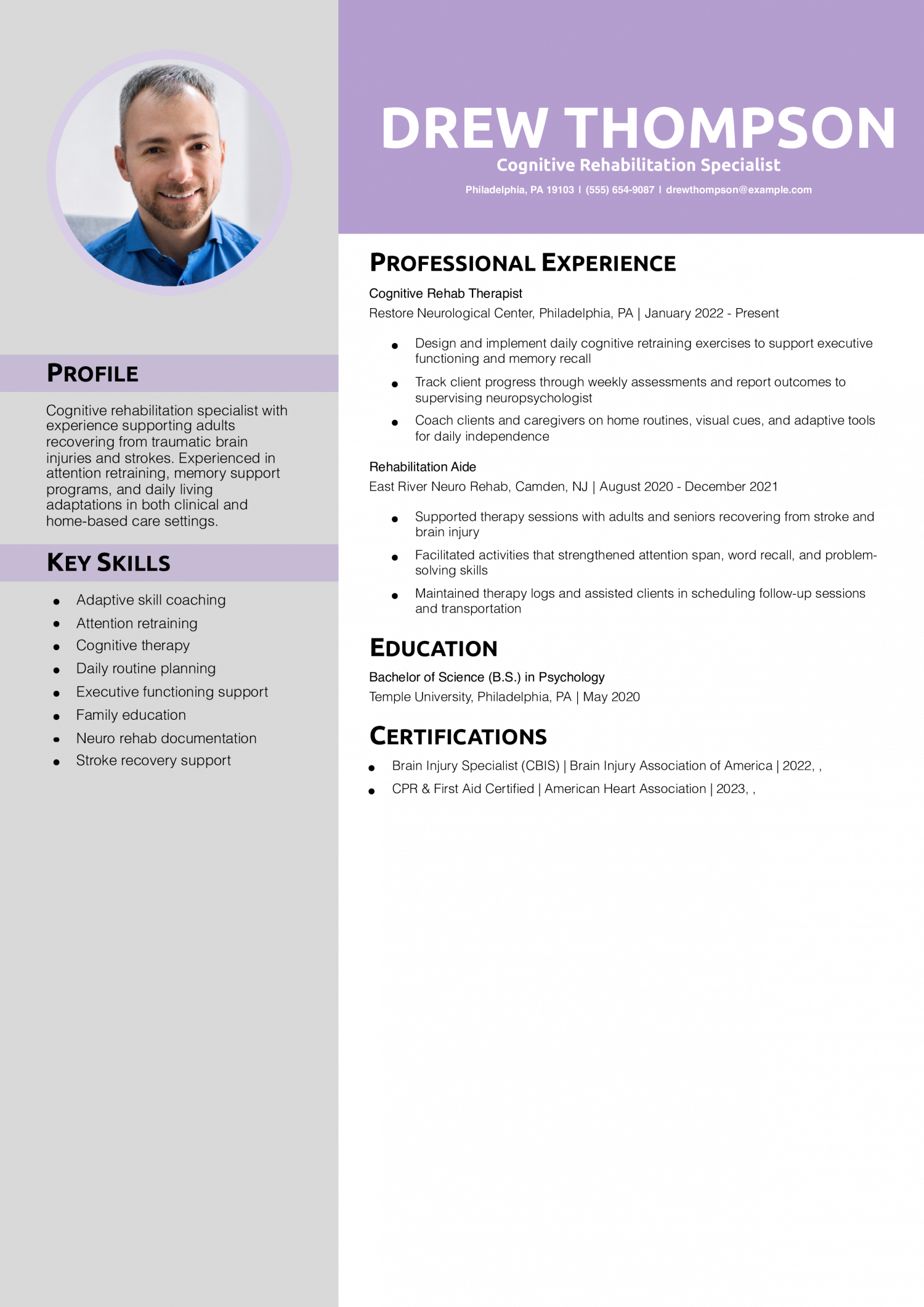
Why This Resume Is a Great Example
Drew Thompson’s resume reflects a specialized blend of clinical skill and compassionate daily coaching. It’s especially effective for neuro rehab settings where communication, patience, and progress tracking are essential. For more insights on building your resume, visit our guide.
Community Health Advocate Resume Example
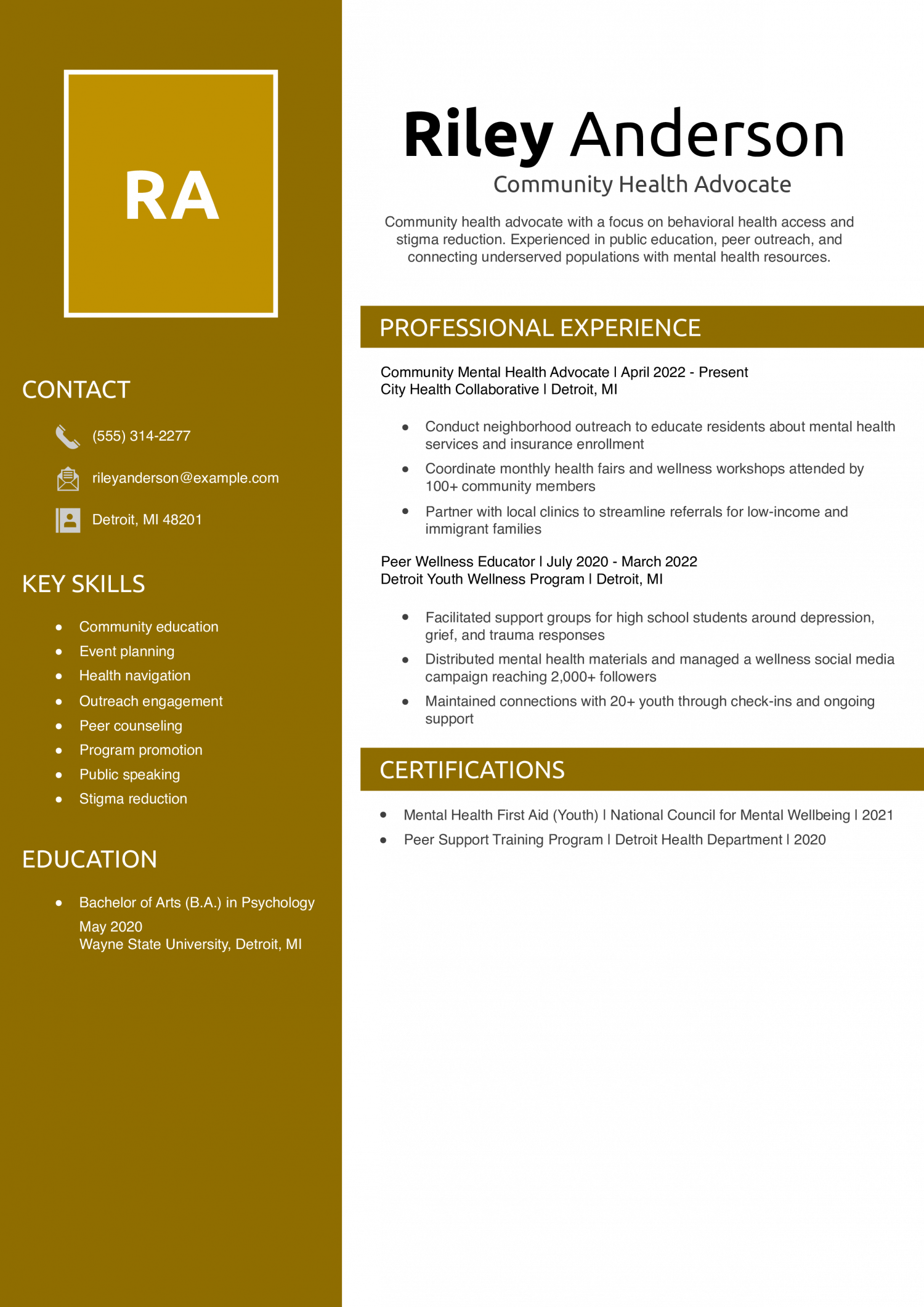
Why This Resume Is a Great Example
Riley Anderson’s resume shows a deep commitment to health equity and community engagement. Each experience demonstrates leadership in reducing stigma and increasing access—vital in public health psychology. For more insights on building your resume, visit our guide.
Psychometrist Resume Example
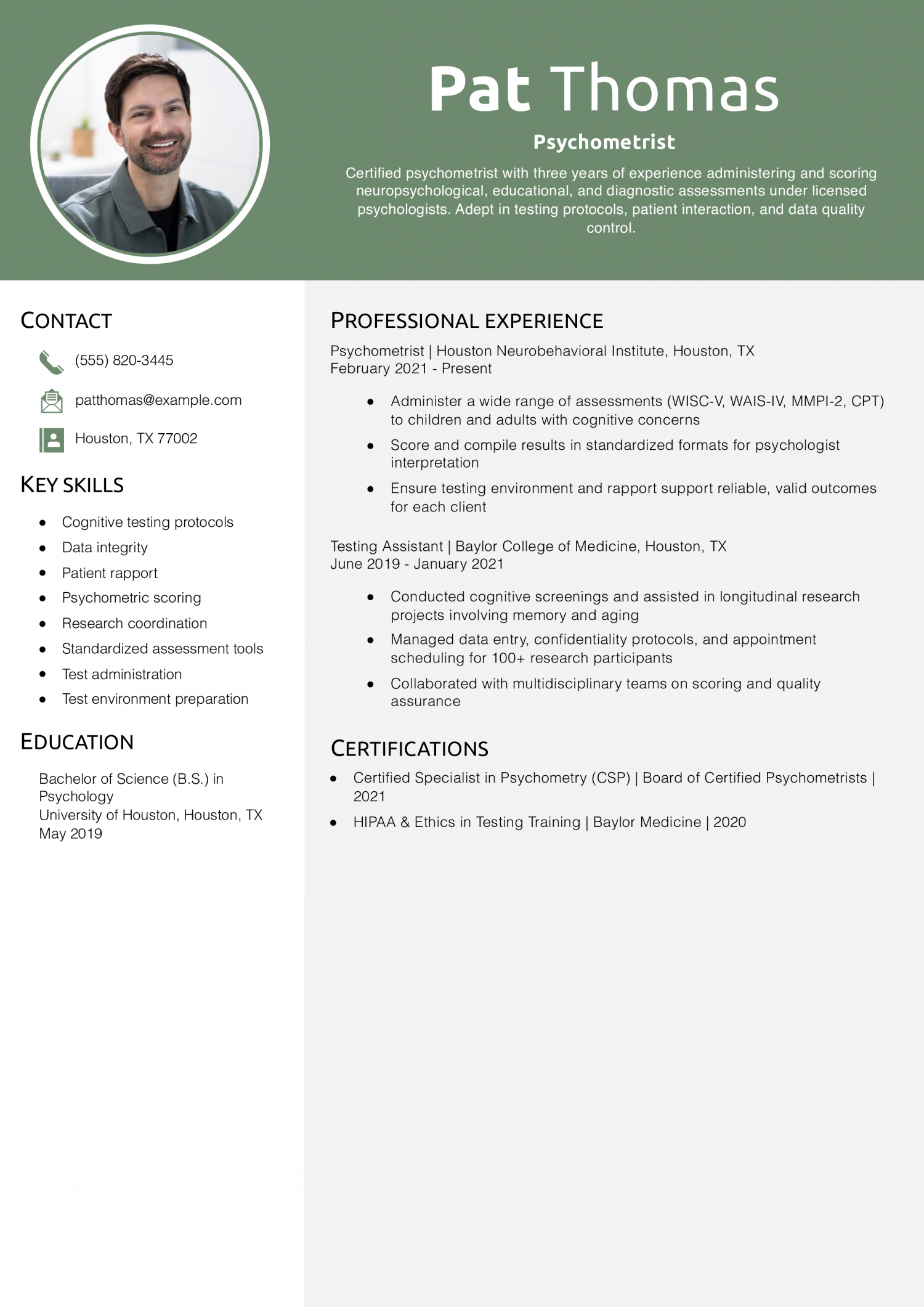
Why This Resume Is a Great Example
Pat Thomas’s resume clearly communicates specialized clinical skills in assessment delivery and documentation. Their certifications and test-specific knowledge make them a standout psychometry professional. For more insights on building your resume, visit our guide.
Psychology Text-Only Resume Examples and Templates
How To Write a Psychology Resume Example
The first step in building your psychology resume is to select a template that provides structure and organization for your content. This allows the hiring manager to easily navigate your clinical background and experience. Opt for a clean, professional layout that avoids flashy colors and overbearing aesthetics, as these visual elements can often distract the reader from your qualifications. Be sure that your template features the following sections:
- Contact information
- Profile
- Key skills
- Professional experience
- Education and certifications
1. Share your contact information
Give your full name, phone number, email address, location, and a URL for your LinkedIn profile. Ensure your contact information is current so potential employers can contact you for an interview. You do not need to include your full address, only city and state.
Template:
YOUR NAME
[email protected] | (123) 456-7890 | City, ST | LinkedIn | Portfolio
2. Write a compelling profile summarizing your psychology qualifications
Leading with an engaging summary at the top of your resume is a great way to draw the hiring manager in and entice them to read further. Start with a sentence that includes your title, years of experience, and three to four clinical skills that align with the job description. Use this opportunity to establish who you are as a psychologist and how you’ve successfully delivered mental health services. For example, you might emphasize your experience providing substance abuse and family counseling to diverse populations in low-income communities.
Senior-level profile example
A licensed clinical psychologist with 10+ years of experience in behavioral health, trauma recovery, and psychological evaluation. Skilled in cognitive behavioral interventions and long-term treatment planning for diverse adult populations in outpatient and community-based settings.
Entry-level profile example
A psychology graduate with internship experience in cognitive testing, group counseling, and behavioral observation. Focused on early childhood development and supporting families through research-backed strategies and inclusive programming.
3. Add an accomplishment-driven professional experience section
To make a lasting impression on the hiring manager, you need to go beyond just listing the therapeutic techniques and clinical skills you’ve cultivated. Your work history section should emphasize how you’ve improved the quality of life for patients throughout your career. Highlight how your individualized treatment plans reduced the severity of symptoms and improved social functioning. Demonstrate how you successfully navigated complex cultural, spiritual, and economic landscapes with empathy and compassion to achieve positive clinical outcomes.
Resume writer’s tip: Quantify your experience
Although it’s not always possible to translate your impact on patients into a hard number, incorporating clinical metrics adds context and credibility to your achievements. For example, you might mention that 80% of your patients achieved goal attainment rates of +1 or +2.
Do
- “Reduced average client anxiety scores by 35% after eight weeks of mindfulness-based therapy”
Don’t
- “Provided anxiety reduction sessions to clients”
Resume writer’s tip: Tailor your resume for each application
To increase your odds of landing the interview, it’s essential to customize your resume to ensure alignment with the organization you’re applying to. In addition to featuring keywords from the description, be sure to provide real-world examples of how you applied these therapeutic techniques in clinical settings. For instance, if a practice is looking for a psychologist with an expertise in neuropsychology, you might emphasize your experience working with patients suffering from dementia.
What if you don’t have experience?
If you’re just entering the field, lean into your education, internships, and volunteer experience. Psychology students often engage in extensive practicum hours, research assistance, and outreach. Include these roles and highlight your understanding of theory and practice integration.
4. Include relevant education and certifications
Education is critical in psychology. Always list your highest degree first and include relevant coursework or thesis topics when applicable. Licenses and certifications are also critical, especially for specialized roles. For example, if you’re planning on pursuing a job at a school, the first step would be to obtain a Nationally Certified School Psychologist (NCSP) credential. You do not need to include license or certification numbers on your resume.
Education
Template:
[Degree Name and Major]
[School Name] | [City, ST]
Example:
Master of Arts (M.A.) in Counseling Psychology
University of Denver | Denver, CO
Certifications
Template:
[Certification Name] | [Awarding Organization] | [Completion Date]
Example:
Licensed Clinical Professional Counselor (LCPC) | State of Illinois | August 2022
Certified Trauma Professional (CTP) | Evergreen Certifications | March 2021
5. List key clinical skills
In today’s job market, most organizations rely on applicant tracking systems (ATS) to identify top candidates during the hiring process. To get through the initial AI screening, include a section that features a comprehensive list of clinical terminology, therapeutic techniques, and other skill sets that match the job posting and align with your experience. In addition, be sure to highlight interpersonal skills to show potential employers that you can connect with patients and interface effectively with multidisciplinary teams.
| Key skills to consider | |
|---|---|
| Behavioral analysis | Case management |
| Child psychology | Clinical psychology |
| Cognitive behavioral therapy (CBT) | Crisis intervention |
| Cultural awareness | Diagnostic and statistical manual (DSM-5) |
| Family counseling | Forensic psychology |
| Group therapy facilitation | Intake assessments |
| Mental health screening | Neuropsychology |
| Patient advocacy | Psychological evaluation |
| Psychoeducation | Research design |
| Risk assessment | Substance abuse counseling |
| Therapeutic rapport building | Treatment planning |
Resume writer’s tip: Use common action verbs
Incorporating action verbs is a great way to add an engaging and dynamic element into your writing. Using proactive language allows the hiring manager to better visualize your contributions. That said, it’s important to diversify your word choice to keep your content fresh and compelling. Below, you’ll find a list of verbs you can use to build the professional experience section of your psychology resume:
| Common psychology resume action verbs | |
|---|---|
| Analyzed | Assessed |
| Built | Collaborated |
| Communicated | Conducted |
| Delivered | Developed |
| Diagnosed | Evaluated |
| Facilitated | Identified |
| Implemented | Improved |
| Managed | Monitored |
| Observed | Performed |
| Presented | Provided |
| Researched | Resolved |
| Supported | |
How To Pick the Best Psychology Resume Template
Choose a clean, professional resume template with ample white space and clear headings. Avoid overuse of colors or graphic elements, especially in clinical or research roles. Your content should be the focus—your qualifications, not your formatting, should impress hiring teams. Pick a structure that showcases your experience and education clearly, especially if licensure is essential for your role.
Frequently Asked Questions: Psychology Resume Examples and Advice
According to the Bureau of Labor Statistics, jobs for psychologists are expected to grow by 7% between 2023 and 2033, with demand strongest in schools, hospitals, and mental health clinics. Despite these positive projections, you'll still need to align your resume with the job description to pursue lucrative opportunities at the best facilities. Start by identifying therapy models, clinical techniques, and specializations that match what the employer is looking for and integrate this terminology into your document.
For example, if an organization is looking for a psychologist with an exceptional background in child psychology and family counseling, feature your experience performing crisis interventions and facilitating group therapy sessions.
A reverse chronological format is ideal for most psychology resumes. This approach places your most recent experience towards the top of your document, allowing the hiring manager to quickly explore your clinical background. That said, recent graduates might benefit from a combination format that prioritizes academic achievements, internships, clinical skills, and practicum placements first.
Include a cover letter with your resume
Although not every job posting will require a cover letter, taking the time to include one can add a personal touch to your application. The cover letter also allows you to speak to employers directly, explaining how your background and values are an ideal fit for their organization, team, and patients.
Check Out Related Examples
Resume Templates offers HR approved resume templates to help you create a professional resume in minutes. Choose from several template options and even pre-populate a resume from your profile.

